#thomas howard 3rd duke of norfolk
Explore tagged Tumblr posts
Text
[In an] undated engimatic letter from the period which has survived [...] [the King instructed Wolsey to][...] 'make good watch on the Duke of Suffolk, the Duke of Buckingham, on my lord of Northumberland, on my lord of Derby, on my lord of Wiltshire and on others which you think suspect to see what they do with this news. No more to you at this time but these few discreet words.' It is unlikley that this referred to anything of the nature of a nascent plot, but it does indicate that Henry and his chancellor were both aware of ill-feeling among the leading nobles and that the King was fully behind Wolsey in his determination to keep an eye on them. Buckingham was especially a marked man and he would eventually be destroyed by his own intemperance or Wolsey's malice or a combination of the two. But he was no faction leader. He was [not][...] adept at intrigue and Wolsey was far from being the only man he had turned into an enemy. Among others with whom he was on bad terms was his son-in-law, the Earl of Surrey.
Wilson, Derek. In the Lion’s Court : Power, Ambition, and Sudden Death in the Reign of Henry VIII.
#edward stafford duke of buckingham#thomas howard#thomas howard 3rd duke of norfolk#(altho this is before he's a duke...obviously#there's often a continuity drawn which i think came from both the commonality of names and the tudors showtime conflating the two#it was thomas howard 2nd duke of norfolk that presided over buckingham's trial and gave the verdict with 'tears streaming' down his face#and thomas howard 3rd duke of norfolk that presided over his niece's trial with the same. but not the same person#derek wilson#thomas wolsey#cardinal wolsey#henrician#henry viii#and idk if that was thomas boleyn...? was he called the lord of wiltshire before he was made earl? honestly don't know#but it'd be interesting if it was#it would suggest he was looking particularly at not just buckingham but those related to him by degrees#the lord of northumberland (at that time; the more infamous henry percy's father)#was the brother of eleanor percy; the wife of the duke of buckingham#white rose faction#(idk? maybe? im just trying to keep my research organized lol#for want of a firmer tag)
8 notes
·
View notes
Text

#fancast#thomas howard 3rd duke of norfolk#charles dance#thomas wolsey#michael mckean#thomas more#steve carrell#thomas cromwell#jared harris#stephen gardiner#mark gatiss#john fisher#peter cushing#tudor history#16th century#english history#medieval confessions
17 notes
·
View notes
Text
I can't help just writing "Oh, this asshole" in the margin whenever a book mentions Thomas Howard 3rd Duke of Norfolk for the first time
2 notes
·
View notes
Text
tudor gothic:
the lord chancellor is called thomas. he runs the country. he wants no part in where england goes from now. the lord chancellor is being arrested for treason. the lord chancellor was executed. the lord chancellor was never arrested. there is no lord chancellor.
the crown is dissolving monasteries. this is standard practice. all the monasteries are shutting down. this is thomas's fault. you have no idea which thomas. the crown wants the monasteries back. the monasteries are never coming back. you visited an intact monastery just yesterday. when you blinked, the ruins gave alms to the poor.
the wars of the roses have just ended decisively. the wars of the roses have been over for decades. the legacy of civil war haunts england. you've watched shakespeare's wars of the roses plays. the wars of the roses must have been over when the throne passed peacefully to henry viii. when you close your eyes, you can somehow hear reginald pole laughing at you.
the duke of somerset was beheaded for treason. so was the duke of buckingham. so was the duke of northumberland. so was the duke of norfolk. so was the duke of suffolk. the duke of suffolk never lost the king's affection. all the dukes are vying for power. but then you remember: there are no dukes. perhaps there never were.
the howards are not to be trusted. thomas howard was thrown in the tower. thomas howard was executed for treason. thomas howard lived out his life peacefully. thomas howard only narrowly escaped henry viii's reign with his life. you are drowning in thomases. they never end. one thing you are certain of, though: thomas howard is long dead. thomas howard will outlive us all.
you know the names of every courtier in the kingdom, and yet more go missing with every passing day. you try to note down the name of thomas wryth, but you cannot put quill to parchment. how is it spelt? wriothesley? you have always known that. you know it deep in your bones. and yet, when you try to say it out loud, words fail you. words fail everyone, where the earl of southampton is concerned. somewhere dark and terrible, an ancient beast awakens from its slumber. like everything else, it is also called thomas.
you turn to noting down the name of the queen. kateryn parr. this is a simple task. your subconscious whispers catalina to you in a distinctly spanish accent. your hand shakes. you try to write down catherine, but it morphs into a k against your will. you drop your quill, hand trembling. nonetheless, there is a name before you. whose name it is is anyone's guess.
mary is queen. which mary? which queen? suddenly, you are not so sure.
the bible is written in latin. the bible has always been written in latin. you flick through the pages of your bible, and greek letters swim before your eyes. you check the book again, and find you are holding a book of hours. all the words are in english. you cannot read any of them.
the king of england has ruled for many years. he is nine years old. the king of england is a foreign power. elizabeth was king; now james is queen. long live queen james!
#thomas howard will outlive us all is a reference to the 3rd duke of norfolk#but like. there's enough of thomas howards it could be several of them#none of them dodged death as well as he did though#inspired by my teacher being unable to decide how to spell kateryn parr's name#historyposting#*casually skips between reigns*
137 notes
·
View notes
Text
Anne Boleyn & Elizabeth I by Tracy Borman
So far the book reminded me to these insane things:
1 Stephen Gardiner forged a fake warrant to kill Elizabeth. And all he got for it was a slap on his wrist.
2 Anne tried to name her daughter Mary... These are my daughters Mary and Mary.
3 Thomas Howard and Anne Boleyn visited baby Elizabeth, and Norfolk slipped away to say hi to Mary.
4 The father of Jane Boleyn was some kind of scholar.
Bonus: Not from the book but recently hit me that John Foxe was in the Howard household (hired by Mary Howard) until Norfolk came out of the Tower. And one of his first things was to kick him out. Which is understandable.
#tracy borman#anne boleyn#elizabeth i#thomas howard#3rd duke of norfolk#stephen gardiner#john foxe#mary i#mary howard
8 notes
·
View notes
Text

Lulworth Castle - Dorset County - England
Lulworth Castle, in East Lulworth, Dorset, England, situated south of the village of Wool, is an early 17th-century hunting lodge erected in the style of a revival fortified castle, one of only five extant Elizabethan or Jacobean buildings of this type. It is listed with Historic England as a scheduled monument. It is also Grade I listed. The 18th-century Adam style interior of the stone building was devastated by fire in 1929, but has now been restored and serves as a museum. The castle stands in Lulworth Park on the Lulworth Estate. The park and gardens surrounding the castle are Grade II listed with Historic England.
The foundations for Lulworth Castle were laid in 1588, and it was completed in 1609, supposedly designed by Inigo Jones. It was built as a hunting lodge by Thomas Howard, 3rd Viscount Howard of Bindon, a grandson of the 3rd Duke of Norfolk. In 1607 Viscount Bindon wrote to Robert Cecil, 1st Earl of Salisbury, crediting him with the origins of the design:
Archive tourist image
10 notes
·
View notes
Note
Part Four
Thar she blows!

II. Norfolk and His Enemies
(First Half)
Ever since I became interested in history I've always believed Norfolk brought down Cromwell in revenge for Anne and George, as to me that's the most natural explanation.
To be clear, when I talk of his 'killing' them, I mean he cooked up the allegations and arranged the show trials, but was 'only following orders' as it were, and Henry is truly responsible.
I am NOT the type to whine that he was The Real Victim in all this: just a wide-eyed, gullible babe-in-arms who Jenwinlee Bleevd Ur Giltee thanks to moustache-twirling Cromwell's diabolical mind games.
But since the King can't be caught (invasion don't look so bad now), we might as well get his second in command.
It's my default assumption, and yet I've never seen it suggested elsewhere, as if it's literally impossible when 'we all know' Anne and Norfolk despised one another.
Worse, it upends two long-held lumps of received wisdom:
1. No one was bothered when Anne died (certainly not Elizabeth!)
2. Norfolk was evil and only cared about himself.
The most noble motivation anyone can accept is him acting out of rage when Thetford Priory was razed to the ground, and how Cromwell degraded the Howards by disturbing their eternal rest.
So people don't mind the idea Norfolk swore vengeance on behalf of these long-dead relatives who died in their beds, but feeling the same sense of outrage for a niece and nephew Cromwell shamed and murdered a mere four years ago is out of the question.
Yet even if Chapuys was right, there's an entire world of difference between bust-ups breaking out within close family units and some outsider taking their lives.
No one would tolerate such a blatant attack on their own kind, because it goes against every masculine instinct to defend the tribe from danger.
This Thomas Howard saw action at Flodden and in the French wars, plus the Pilgrimage of Grace and Wyatt's Rebellion: prepared to kill and be killed in defence of the country.
But now his own flesh and blood are being butchered, and you're telling me such a military man doesn't mind?
Oh no. Instead we should accept Cromwell and the Cardinal were simply perfect angels who no one could ever dislike for any respectable reason.


Regarding Wolsey, I shouldn't think this incident helped.
Norfolk was dispatched to Ireland in 1520 and took Elizabeth and the children along for the entire campaign.
As both of their fathers were still alive there really is no reason they couldn't have remained at home in much more secure conditions; so perhaps wanting their company could be a sign of at least some affection for his young family.
Norfolk arrived in May but three months later:
'There is marvellous death in all this country, 'which is so sore that all the people be fled out of their houses into the fields and woods, where they in like wise die wonderfully; so that the bodies lie dead, like swine, unburied'.'
By 'marvellous' and 'wonderful', Norfolk doesn't mean it's 'nice', or that he likes it; it's his own expression of horror.
As what he describes there sounds like absolute Hell made visible: a glimpse of the End Times playing out all around him in suffocating proximity.
The populus is rapidly declining before his eyes: people forced to abandon ailing relatives to die alone to save themselves, having nowhere else to go but resort to shivering vagrancy in the undefended wilderness, only to soon realize they too are infected and doomed beyond all mortal help.
And those coming along later, seeking safety, being met with the putrefying yet still-recognizable corpses of friends, family and neighbours, stepping through the rancid sea in hopes of finding a sheltered little spot to sit, in full knowledge it will be where they too shall die.
And the stench and the screaming and the ever-present throbbing terror of it creeping closer and closer until there's only you left to go.
'Wishes to have leave to send his wife and children into Wales or Lancashire, to remain near the seaside till this death cease.'
Well it's no place for loved ones to be, so Norfolk writes asking permission to send them off without him, therefore no royal business will be affected.
It's a rather poor show when a husband and father can't simply act immediately to protect his family, and is instead obliged to go through this insufferable rigmarole of writing and waiting, with the implication that even after the long, drawn-out silence they still might refuse.
They could be dead b' then!
'Anxiously desires a letter, 'for never sith [since] my departure from London [have] I had [a] letter from the King's grace nor you; and also to continue my good lord...'
If he's had no news in three entire months, what's the likelihood Wolsey will bother to open this particular message, no matter how desperate the situation might be?
Norfolk's grand plan isn't even to ship the wife all the way home, but for Elizabeth and the little 'uns to hide on this side of the Irish Sea, as he's intending for them to come back later.
(I enjoy thinking of him arranging their stay 'near the seaside', as if it's a holiday to Blackpool to build sandcastles and have ice creams!)
He must truly value both their welfare and company, so wants the separation to be of as short a duration as is possible, which has certain strange implications for his marriage.
Did you...did you actually love her at one point, Norfolk?
And she loved you?

In the first letter Norfolk was working himself up into a state, and here we are, one month later, and nothing's bloody improved.
'Eighteen soldiers have conspired to steal a fisher-boat of sixteen tons, go to sea, get a better ship, and turn rovers.'
In fact it's worse, as now he's dealing with mutiny and piracy—
'Victuals are so dear, the soldiers cannot live on 4d. a day.'
—Brought on by poverty and starvation, which he can do nothing about—
'Wishes he had the same authority as Dorset had in Spain, or as he has upon the the sea; otherwise he cannot keep order.'
—Because despite being marooned without news from the outside world, no one even bothered to grant him sufficient power to run the place.
'The death continues in the English Pale.'
To top it all, that stinking disease never went away—
'Has had no answer to his letters, and wants money.'
—But he didn't move the family as them heartless bastards never bloody wrote back!
He'll be tearing his hair out, man!
Damn straight, 'cause for all he knows they might sicken and die before him at any time, being:
• Elizabeth, aged about 23, heavily pregnant or recovering from childbirth;
• Catherine, aged 4 or 5;
• Henry, aged 2 or 3;
• Mary, aged under or about 1;
• Thomas, either a newborn or still expected.
Elizabeth is in a very vulnerable state and the children are young enough to be carried away by any slight chill, yet we're facing a veritable apocalypse not so much at the gates as ringing the doorbell.
This is a man whose entire first family were wiped out as if they never lived at all, and now his second wife and crop of children are in the path of some old Biblical malady that's cutting through the population like the scythe of the Grim Reaper.
Someone who's buried at least four kids WILL get jumpy at the first sniffle, regardless of severity, and you can't say he was wrong when Catherine died at fourteen.
There's also the fifth child, Muriel, about whom nothing is known, not even when she ceased to be.
But if she died right then, precisely because Norfolk never had permission to send her away, I couldn't fault any murderous urges in him.
All in all, compared to the previous letter promising life-long devotion and service—
'...And during my life, to the uttermost of my little power, I shall endeavour myself to serve and please the King's grace and you'.'
—Now bitterness over that same 'little power' and the sense of going unappreciated are creeping in to the text.
And given the mentality at the time was never to blame Henry for his own boorish behaviour, Wolsey's the obvious scapegoat.


Now between the deaths of Anne and FitzRoy comes the destruction of Lord Thomas Howard, but whereas the attainder against him arose in Parliament on the 8th of June (No. 1087), this seemingly was kept secret given he attended William's wedding on the 29th (No. 1222) and wasn't questioned until the 8th of July (above), at which point Mary Howard was also implicated.
Even if it took time to show up in the parliamentary schedule (being of a peculiar order), and so wasn't passed on the first day, whoever's pushing for it had to know it was coming long before to prepare it for the June sitting, and it sounds as if Margaret at least suspected something by warning Thomas Smyth.
(And I want to see this 'phisnayme' (the old word is 'phisnomy', as in the face) of Margaret so badly.)
The only explanation for this delay would be that Thomas was under surveillance during the intervening month, no doubt to see what else could be dug up even after his condemnation.
At a quick glance, the summons to Parliament went out before the 7th of May (No. 815), with Henry making ominous reference to the succession before Anne was even convicted or her marriage annulled (EE JENWINLEE BLEEVD!!!), and so I'd assume its list of business was mostly settled by that date, as with his fate.
If therefore he was being watched by May at the least, then no sooner were the Boleyns annihilated than the net went out again to ensnare any other related parties, and even perhaps in parallel.
Is that not...somewhat revealing?
Should Norfolk have turned on Anne and thus supported the plot against her, if merely in spirit, one would expect he'd be sufficiently secure for this never to be an issue in the first place.
For it would no longer be a case of the King's niece marrying the disgraced Queen's uncle, but affiancing the younger brother of the most esteemed Duke of Norfolk, and might even count as his reward for treachery.
It's always said that with Mary and Elizabeth disinherited and James being a foreigner, then Margaret Douglas was technically heiress, and so Thomas Howard was accused of plotting to seize the throne for himself.
But I don't think Margaret was even considered legitimate under English law, hence why she ended up omitted from Henry's will in due course.
And the attainder is in the same batch as the Second Succession Act, which is recorded as having passed on the 8th of June, with his interrogation occurring only ten days before it received royal assent on the 18th of July, alongside the Treason Act, meaning anything Thomas did before June wasn't even a crime, whilst events between June and July happened within a legally grey timeframe where either might theoretically apply, but unofficially.
(That last link doesn't even record when the Treason Act passed, as if it didn't, and was instead fast-tracked for Henry's unchallenged approval, which is all very fishy.)
Yet if the order given in the archives is correct, then Parliament condemned him (7th) before the succession (41st) even came up, and good old Henry prioritised murdering harmless youths over the security of the realm.
By their own admission Thomas wasn't trying to marry the heir, as that was still Princess Elizabeth, both when he first loved Margaret and at the exact moment they attainted him, because although her parents' marriage was already annulled, Elizabeth was made heiress by one Act and so it took another to remove her.
Instead the rumour goes (from Chapuys, so we have to tread carefully) that the purpose of this Act clearing the decks and letting Henry name anyone heir (a very suspicious clause in itself) was to make FitzRoy king, but he put the kibosh on that by kicking the bucket.
In June (No. 1069, a few paragraphs down) Euse claimed Robert Radclyffe, 1st Earl of Sussex (father of Norfolk's brother-in-law) proposed before the Privy Council that since Mary and FitzRoy were both bastards (and Elizabeth don't count) that they might as well prefer a male over a female, an idea which Henry failed to oppose.
Yeah right. That's what Sussex got told to say so Henry could put on a show of 'bravely' heeding the wisdom of his advisors by doing what he wanted to do regardless.
Adding it up, the idea Thomas was mistakenly arrested for treason, as if those behind it meant well, is utter nonsense, and he was crushed by the evil just as Anne was before him.
Come on, they've convicted him before the new law he 'broke' about marrying royalty even arrived, and which was drawn up because of this situation, as with Katherine Howard, so how can that be explained unless they purposely wanted him dead?
Interestingly, the John Ashley questioned here is probably Kat's future husband, plus the 'John Asheley' close enough to Anne to borrow £100 (No. 912), which was still on loan at the time of her murder.
I bet he coughed up sharpish.
And the 'Lady Boleyn' they're avoiding must be Elizabeth Wood, John's aunt and wife to James Boleyn, who's at her fetid tricks spying and preying upon innocent people again, as if that's her default setting.
It makes me imagine she was so notorious for her creeping, conniving ways that's exactly why they chose her to betray Anne, and I daresay she heard nothing more about this thanks to services rendered.


Isn't it a bit too much of a coincidence that this 'scandal' (No. 147) was only officially discovered after Anne's arrest, apparently, or at least, a long-standing love affair suddenly became a problem then, because somehow no one noticed it during the previous twelve months?
And THEN Mary Howard gets a mention, despite them envisioning her as the next Queen of England, and so you'd assume everything would be done to keep her out of it.
'The King is much mortified "devant mariage dicelle sa nyece;" much more because he has no hope that the Duke of Richmond can live long, whom he certainly intended to make his successor, and but for his illness, would have got him declared so by Parliament; and this was one of the reasons why he was so very urgent that the Princess [Mary] should approve the statutes that made her a bastard.'
Everyone was cast down and humiliated to smooth the golden path for FitzRoy, but no one expected him to collapse along the way.
I also wonder that if Thomas was now considered unsuitable if Mary Howard might also have been under the same shadow once Anne was gone, particularly as it was a marriage she arranged.
It's all very well a duke marrying a duke's daughter when that's the most he's ever gonna be, but if Fitzy's facing kingship it's simply not a good enough match anymore, so who knows what would've become of her.
After all, is this really much different to Lady Rochford's later activities?
'...And they have condemned to death...the younger brother of the Duke of Norfolk for having treated a marriage par parolles de present with the daughter of the Queen of Scots and Earl of Angus.'
Whilst Chapuys is only mentioning Norfolk so Charles can understand who Thomas is, doing so gives the impression Henry's outrage is firmly laid at the Duke's door.
'A statute has also been passed making it treason to treat for marriage with anyone of the blood royal without the King's consent.
The said personage of the blood royal was also to die, but for the present has been pardoned her life considering that copulation had not taken place...'
Henry was ready to cut his own niece's head off after she broke a law he invented precisely as an excuse to kill her.
I suppose in the end Mary survived just as Margaret did, i.e. non-consummation of either union, whilst Thomas was kindly left to suffer and die in gaol as a treat.
Here is an extremely sad letter from Margaret (No. 294) grovelling in gratitude to Cromwell and promising to throw Thomas's impoverished servants out on Henry's orders.
(I do hope she found the pair another home as I hate to imagine what happened to them otherwise.)
'Desires Cromwell 'not to think that any fancy doth remain in me touching him.'
I refer you to her poem from Part Two for how much I believe that.
Still, Margaret caved immediately, and no wonder with Anne's example before her, besides Princess Mary almost going the same way.
On that note, people too readily overlook the horror of Henry almost murdering his wife, niece and daughter in sequence (Anne in May, Mary in June, Margaret in July), besides his palpable eagerness to do so, as they want you to see him as a big ol' cuddly teddy bear who Didn't Do Nuffin.
But the period between May 1536 and October 1537 is much underrated in terms of all-out, no-holds-barred utter lunacy:
A queen's just been decapitated; there's no designated heir, and for half of it no sign of one; the kingdom's about to tip into civil war and a thousand years of Christianity and near enough all English art and beauty that's ever existed is being battered and burnt before their eyes.
And all those who thought time would turn back so obligingly and it'd be endless sunshine and rainbows once they brought down that pesky Anne Boleyn are coming around to the realization that's it's got so much worse without her.
The tale of Thomas, Margaret and their doomed romance may only seem an insignificant portion of it, but there's something unnerving about how it slotted together so simply at the most opportune moment, where the one remaining claimant had to be erased before the grand plan took shape.
I kid you not: the rumour at the time (No. 532 & No. 533) was that Henry wanted Cromwell (!) to be king, as he 'loved [him] so', and handed over Margaret behind the scenes like a tearful virgin sacrifice, and therein lay Cromwell's motivation to be rid of his 'love rival' forever, which also casts him intervening for her in a very different light.
EEEEEEEEEEEEEEE! Like bloody Frollo and Esmeralda!
Now Cromwell being next in line is plainly absurd, and as he didn't marry Margaret once the fuss died down, we must presume that was never his intention; unless of course the discovery of everyone's violent opposition put him off.
(And good on the boys for wanting to avenge Thomas and defend Margaret's honour.)
It's a bit much painting Cromwell as the kind of creaking old pervert who'd accept young girls as gifts, or bribes even, yet these rebels are fixated with blaming anyone but Henry for his own actions, as was the fashion.
Ironically, this is nevertheless almost the exact same charge Cromwell went down for, except then it was having designs on Princess Mary, implying Henry kept the accusation in mind for future usage.
(And that rumour supposedly went about in July 1536 (No. 41, at the end) 'cause Henry ain't got no new ideas.)
Still, imagine if we could prove the epically beautiful Margaret really was the ultimate lip-smacking prize Henry dangled before Cromwell to goad him into spilling Anne's blood.
For I can't help sensing a genuine malice to proceedings where Henry wasn't about to let anyone be happy without his permission, to the level that a quick death was deemed too good for Thomas and so he can languish alone and in pain knowing he'll never see Margaret again.
And she's too useful to squander upon the scaffold, so let her live and remember.
On the one hand, Chapuys has no reason to 'embellish' the truth these days, but on the other, how can you ever trust anything a liar says again?
But his belief in FitzRoy's imminent elevation makes more sense than leaving the succession empty for the foreseeable future, especially as from June onwards he insists Henry's gone sterile and definitely won't get kids off Jane, who's barren.
Give 'em chance to breathe, man!
He also defends Margaret, which makes a change:
'...And certainly if she had done much worse she deserved pardon, seeing the number of domestic examples she has seen and sees daily...'
That'll be a dig at Anne no doubt, yet it's in the plural, so I'd love to know who else he means.
'...And that she has been for eight years of age and capacity to marry.'
Too much information there, love.
It's one thing to observe Margaret's over the legal marital threshold, but how does he know what her 'capacity' for it is, exactly?
I'll bet he's considered Princess Mary's 'capacity' before now.
I'll bet he has. Dirty bastard.
Margaret being his best beloved's old mate makes her 'one of the good guys' and so he's willing to talk her up, ignoring she was also Anne's lady-in-waiting, friend and companion for three years and so must've been cheerfully covering for all that beastly incest that was definitely going on.
But that's alright. Obviously Anne the Slag was corrupting Margaret.
Euse is coming out of two really long months of his 'EN IZ UH HOR' routine, leading the oh-so righteous charge against 'the Concubine' and salivating over her brutal murder, not to mention rubbing his claws together at the thought of 'the Little Bastard' being disowned as the daughter of George / Norris / random peasants and slung into the streets to starve to death.
But the moment a REAL secret affair gets exposed and it's all:
Well, what d'yer expect?
According to him, if Margaret's twenty then it's only natural any woman THAT much over twelve is gonna have certain urges and want to explore them, so even if she had slept with Thomas in or out of wedlock then Henry should just get over it as it's his own fault for keeping her single.
Ooooooh, very liberal!
Yeah man, these things just happen, don't they? It's no big deal.
Anne's a whore, tho.
'Since the case has been discovered she has not been seen, and no one knows whether she be in the Tower, or some other prison.'
Not sinister at all!
Yeah. Margaret's just vanished off the face of the earth after her uncle spared her 'for the present', but that's not saying he won't change his mind.
So yer'd best watch yerself, love!
This may not seem directly related to Norfolk, but I'd have thought if he'd had any part in killing Anne that the State might have stopped persecuting his family by now.
The Jane Parker fans like to highlight her financial woes during these months as proof she couldn't have testified against George, but if so, I'd have said Norfolk witnessing his brother done for treason was a bigger vote in his favour.
Mary Howard's connection is very worrying, especially as she's chaperoned Margaret 'divers times', and is therefore more in on it than the other friends and servants, and in doing so openly concealed and facilitated 'traitors' longer than any of them.
You'd almost say she was second in command after Thomas and Margaret themselves, so it's difficult to believe she got out of it just because the couple under sentence of death covered up for her.
Had FitzRoy survived, I wonder if they'd want rid of her quietly with a nice annulment to make way for a prime foreign alliance, with this threat pushing her father to agree.
And maybe she and Margaret escaped serious punishment thanks to the scheme fizzling out altogether, despite handing Henry another excuse not to support her, as if he needed one.
I wish more attention were paid to such a blatant stitch-up, as whilst it may not be a nefarious conspiracy on par with the one that took down Anne, none of this happened by accident.


Chapuys wrote of FitzRoy's decline on the 23rd of July, meaning he was conking out at that very second.
You'd think laying him to rest might be a matter for his own father to arrange, but no!
Turns out he's too tight to even finance the burial of the bloke that could've been his heir five minutes ago, and shunts it on to someone else instead, as usual.
In the normal run of things a family is patrilineal; that's why a wife takes her husband's name and so do the children as the next generation of his 'house'.
Yet as a bastard, them rules don't apply, and the child reverts to the mother's line.
But it's as if calling him 'FitzRoy', being an invented surname bellowing his illegitimate status, specific to him and him alone, more or less cut the boy off from both sides to stand alone as an entirely brand-new dynasty that simply popped out of the ether one morning.
Yet as it only contains him, then he was almost grafted on to the Howards upon marriage to give him a group to which he belonged, that is until Mary had children to expand the surname, whereupon he'd break away and she'd join his 'kind', if you will.
But having carked prior to all that he finished life as a quasi Howard adoptee, and so into the family vault he went.
'The King wished the body conveyed secretly in a closed cart to Thedford, 'and at my suit thither', and so buried...'
Seems Henry wanted a cloak-and-dagger job where they snook the stiff down to Thetford all hush-hush and the like, specifying a 'closed cart' to hide the grisly contents from snooping onlookers, which makes it sound like Fitzy can't even got a flamin' coffin these days and got tossed not just hither, but also thither (which is important), in the nice-and-airy boot of a clapped-out Robin Reliant.
'...Accordingly I ordered both the Cottons to have the body wrapped in lead and a close cart provided, but it was not done, nor was the body conveyed very secretly.'
What a come down, eh?
One day it's all kind hearts and coronets and the next you're nowt but any old cadaver rolled up snug in Norfolk's much-frequented, cast-off dayglo hearth rug.
But yer just can't get the staff these days and once the bloomin' Chuckle Brothers get hold of 'im they bunged the boy wonder in the back of the local ice cream van (between the soft scoop and Soleros) and trundled into town blaring bloody Greensleeves luring all and sundry out to have a good gawp at proceedings.
Worst of all (No. 164), turns out Richard and George Cotton were Fitzy's out-of-work home helps who were badgering Henry for black cloth and job offers before their previous boss was even propped up on the beaded seat cover.
Chapuys's version (No. 221) is that they dumped him in a wagon and draped a load of straw over the eight-day-old corpse in the middle of summer (eee) and just had the Cotton-Eye Joes (?) skipping along behind in full Lincoln Green like it was bloody Robin Hood themed.
'Few are sorry for his death because of the Princess.'
But that's okay as no one gave a toss about him and everyone's actually totally glad he's dead as they've also all worn themselves arthritic fantasizing about Mary sliding on to their throne.
'...And thank God she now triumphs, and it is to be hoped that the dangers are laid with which she has been surrounded to make her a paragon of virtue, goodess, honour and prudence: I say nothing of beauty and grace, for it is incredible.'
If Mary don't get a restraining order he's gonna start drinking her bath water.
'May God raise her soon to the Crown for the benefit of his Majesty and of all Christendom!'
I presume he's now referring to the Emperor, else he's saying he wishes Henry would hurry up and die as being dead would really do him the world of good.
'Even Secretary Cromwell has congratulated her in his letters...'
Watch out Euse! Yer got competition!
Whilst I doubt Cromwell, whatever he felt, would dare say on paper that he was glad Henry's only son was dead, and most likely this is Chapuys projecting his own revolting personality on to others, I'm grimly fascinated by the idea of Mary attracting all these unwanted ancient admirers who'd think Philip never had it so good.
And now Norfolk's gotta go cap in hand begging this rather macabre Cromwell for forgiveness even when the latter's apparently glad to see the back of poor Fitzy.
'I trust the King will not blame me undeservedly.'
Well think on, flower.
I don't know why the Cottons gleefully flouted instructions and risked their livelihoods.
I don't know why Norfolk would dare disobey his 'Master' and not supervise proceedings with obsessive scrutiny.
And I certainly don't know why Henry demanded all this whispered fannying about as if he was suddenly ashamed of FitzRoy's existence.
Some say this shifty attitude suggests Junior was bumped off, where because his stepfather's men joined the Pilgrims he would've done too, so Senior soon put a stop to that.
But that's silly.
First, if Henry somehow got wind of rebellion brewing months in advance I'd have thought he'd do a bit more to quell it than killing his own son, as if that's gonna help.
Secondly, he hasn't spent close to three decades gagging for a male heir simply to stuff the only one he has got.
If anything, I'd say FitzRoy could've whipped up insurrection himself and led the revolution, and Henry wouldn't have done much more than shake his fist at him.
He's not angry. He's just disappointed.
And from Fitzy's view, why bother?
He must've heard he was heading for the big time by now, so should he ever sympathise with the Cause, then all he need do is wait for Henry to pop his clogs and he's got free reign to do whatever he wants.
Yet imagine FitzRoy living, and being promised the earth; then Edward shows up.
What a kick in the teeth!
So even though this theory is absolute gibberish, I can't think of an alternative.
'This night at 8 o'clock came letters from my friends and servants about London, all agreeing in one tale: that the King was displeased with me because my lord of Richmond was not buried honourably.'
As for the oh-so confident assertion that 'everyone' judged Norfolk to be 'a twat', I marvel at how all these 'friends and servants' inundated him with warning messages then, as if they were worried about him.
Sounds like the perfect opportunity to be rid of the old git, eh? Most curious.
I suppose they're all 'twats' too.

There's another letter to Cromwell on the 6th where Norfolk's really tipping into panic after two more pals sent him word, and that's loads worse as they're sober old gentlemen who 'would not write with some ground'.
And mailing missives one day after the next is a sure sign something's up; usually you only see back-and-forth correspondence in the records once a week.
'I desire to know the truth by this bearer, who shall meet me ere I come to London; spare not to be plain to me.'
This is on Sunday night, he plans to reach London by midday on Thursday, and in that time the postman's gotta race to Cromwell and almost all the way back as he meets with Norfolk on the road to tell him what's up.
It's THAT serious.
And God bless Norfolk for riding into the jaws of Hell in full knowledge this could be it for him, as it's fairly obvious to read the gist of the friends' letters from his own, where it's not:
Ooh-ho-ho-ho-ho, you'll get a good ticking off this time, mate!
But more:
HE'S GONNA KILL YER, MAN!!!
'It is further written to me that 'a bruit [rumour] doth run that I should be in the Tower of London.'
This appears to be an unrelated topic, as the average Londoner won't know anything of the burial yet, if ever, so what's he done to deserve this?
The aggression is entirely Henry's own evil predisposition swelling up again, so the idea 'the people' are also gunning for Norfolk for no reason is far too coincidental.
An obsessive, paranoid and murderous tyrant craves insider knowledge on public opinion, especially when his own behaviour has triggered so much upheaval and ill-feeling.
Wouldn't he, in such an uncertain era, really need a fair few informants mixing in with the hoi polloi to gauge popular reaction, and round 'em up if they looked likely?
(Henry personally orders spies to prey upon and betray his people later in the year (No. 1178), so the idea is not unknown to him.)
And once we're there, what's stopping said subversive from manipulating mob sentiment for some higher (or rather, lower) purpose?
All he need do is start spreading a few scripted slanders, and when it gets around his employer can claim 'everyone' thinks it because it was spoken aloud once.
This is Henry's own personal vendetta, and whether it be solely down to his son's send-off (which he himself commanded to be as miserable and lonely as possible) or goes much further back, the idea that Londoners miraculously agree with him, and right at this very moment, meaning if he kills Norfolk it can be paraded as 'the will of the people', with Henry a merciful public servant devoted to his subjects' wellbeing, is freakishly unnatural.
'When I shall deserve to be there Tottenham shall turn French.'
Eeeeeeee! No, not that!
'I would he that began first that tale of mine, he being a gentleman, and I, were only together on Shooter's Hill, to see who should prove himself the more honest man'.
Yeah! Just you wait, lads! He'll have that meddling whipper-snapper over his knee then DUEL HIM TO THE DEATH before you can say 'Howard the Duck'.
Note he's quite sure only one fella is responsible, implying a deliberate attempt to whip up trouble, whereas a real general unpopularity would arise in many people at once as they all instinctively react to the same information.
I wonder if describing the shady figure as a 'gentleman' is a coy social nicety, or an actual belief the man belongs in the gentry with lofty connections.
If idle talk's going round London, I'd picture some loosed-tongued workman shouting the odds, or even a bunch of housewives regaling one another with tall tales.
Why then would Norfolk assume any tavern tittle-tattle was the work of a 'gentleman', which implies respectability, and thus honesty, when he could instead belittle them as a 'knave' or 'ruffian', and so undermine their words to aid his own plight?
And does the advertised threat of violent retaliation in a letter to Cromwell signify more than it seems?
After all, Norfolk made a point of saying his 'friends' were writing en masse to warn him of Henry's savage intentions, but Cromwell wasn't one of them.
Because he didn't want him warned.
As the Boleyns and the Howards were meant to all come down together.
'Your son is in good health here...'
The oft-repeated blabber of Norfolk hating Cromwell from day one never includes Gregory's madcap holiday hijinks.
'Cause it ain't enough to lay prostrate before the powerful but now yer gotta bankrupt yerself putting their kids up with bed, board and entertainment like a bloody five-star hotel now.
Yer house ain't yer own!
Is Greg supposed to be grand pals with Surrey and Bindon, and no hard feelings later?
Or are they on their best behaviour pretending to like him whilst flicking the Vs behind his back?
What's Mary's opinion?
He could've snapped her up if he'd played his cards right!
Speaking of which, did Greg attend Fitzy's funeral?
Did Greg report on Fitzy's funeral?
(Well how else did Henry find out?)
Is he a spy?
Yes!
Does Norfolk know?
'Course he bloody does!
So the Duke loses three relatives to the King's ravenous hatred, and then leaves Court taking an enemy informant back home with him?
They've a taste for blood!
And for this extra-special mission, Cromwell selected the one bloke he trusts the most to be certain of the utmost loyalty and fullest correspondence; all whilst Greg feeds off the very family they're desperate to destroy.
Can't even flamin' speak yer mind in yer own gaff these days!
Greg's a knob.
'...With the hand of him that is full, full, full, of choler [anger] and agony.'
Ooooooooh, camp!
'P.S. I have at this hour finished my will...'
Bloody hell, Norfolk! We're tryna have a cup o' tea here without you bringing us all down!
The heavy postal load this evening obviously put him in a right old morbid fit, where the SHADOW OF DEATH stalks his every waking thought.
The real irony is how it gives him a mind to settle his affairs before it's too late, even when should the worst happen, the entire point is they'll be robbing him blind first.
What a feckin' waste of time that was!
'...And written it twice...'
He's obviously gotta make two in case Henry produces a substitute scratched on a beer mat where Norfolk just so happens to leave all his worldly possessions to that dear Master o' his.
But don't tell 'em there's a copy, man!
They'll be turning yer house over ter lay hands on it!
'...And shall leave one part with you as my principal executor whom I trust next [to] my master...'
So not a bit then.
'...Whom I have made supervisor of the whole.'
As a will is utterly useless where he's going, this could be an elaborate ploy for sympathy.
Come on, lads! I'm just a poor little old fella teetering on the edge of death!
You don't wanna be killing me! I'll be gone soon anyway!
Crafty sod outlived the pair of 'em.
'I trust when I die you both will consider I have been to the one a true servant and to the other a faithful friend.'
Translation:
I'm a good girl, I am!
He's both implying his passing is imminent, and so hurrying it on is an needless extravagance, but also that when it happens they'll both miss him, thereby planting the idea it will be a natural death, that it should, and must be, even, and changing that would go against the natural order.
As I peruse these letters I have the fancy that Norfolk spent a lot of time watching and observing human behaviour, and developed a fair grasp of psychology long before its invention.
In doing so he learnt the exact method of provoking pity, or at least doubt and hesitation, which bought him enough of a reprieve to survive until the political situation shifted to his advantage.
I can think of no other courtier who had THIS many close shaves but nevertheless died of old age when so many young men and women begged and pleaded for their lives and yet received no such mercy.
'Sic transit gloria mundi.'
Or 'So passes the glory of the world', as I would say.
Is this Norfolk's opinion on his own demise?
Ooooooh, get you!

Whatever he said to Henry must've done the trick as here we are on the brink of civil war, which you could say ended up saving Norfolk's bacon in the long run.
But it's not all glamour.
This link leads to one of the most densely-packed fatboy collections I've come across, which gives you an idea of the sheer pandemonium unleashed as reports start flooding in from all sides.
It feels like combing through week upon week of correspondence and it's only five bloody days, albeit five days of insanity; ranging from the fun stuff where Bess Holland's uncle John Hussey, 1st Baron Hussey of Sleaford, won't leave the house in case the rebels look at him (No. 561), to horrors beyond belief where one of Cromwell's men was ripped apart by dogs (No. 567).
I'm trying to make sense of where Norfolk came into it, but it's such a mess I haven't really got a grasp on matters.
On the 7th of October (No. 579; 2) Norfolk's to prepare the assembled forces for Henry's inspection:
'That my lord of Norfolk be sent immediately to Ampthill to exercise the office of High Marshal, and to set the army which shall be then arrived in order, that the King at his repair thither on Monday may view them and dismiss them from time to time with thanks and good entertainment.'
Sounds like when Henry got thither he expects a table of cream cakes and a flamin' juggling routine.
Then on the same day (No. 580; 2), Norfolk's designated as on Henry's defence team and must supply 600 fighting men to boot.
(Presuming I've read it correctly, do note how much bigger his protection squad is compared to Section 1's list of those to be sent north, whilst Jane's bodyguards are practically non-existent, and that hoity-toity Henry insists on being guarded by his highest ranking subjects.)
Further down, Section 5 lowers the quota to 500 men, being diminished along with everyone else's, suggesting conscripts were already hard to come by.
And now we've only got to the 8th, and Norfolk's staying home instead!
'...Received the King's letters, the most 'discomfortable' that ever came into his hands...'
He wasn't saying that a couple o' months back when all the pen pals frightened him into hysterics.
Nah, but he's givin' it good grease, where the most soul-devouring fate imaginable is not serving and dying to protect Henry VIII.
'...Commanding him to send his son with as many horses as he can furnish, and himself to stay at home.'
Daft old Norfolk's knightly pride is imperilled when it turns out he'll be missing out on all the action, as that spells the eternal pipe and slippers.
There comes a phase in any man's life when the ever-pressing flow of time compels him to pass the torch on to the next generation, to lie at rest in the twilight of his years as those youthful fresh faces make a name for themselves in his stead.
OH NO YOU DON'T!
'If he sends away his horses, can do no service in repressing the people here, nor come to the King when commanded.'
Given his role of royal attendant appears to have vanished within a day, talking of what should happen when Henry calls on him is more wishful thinking rather than any concrete expectation of such.
You never know: one snub like this and it could be curtains on his career.
Well Norfolk ain't 'avin none o' that, for he's raring to get stuck in:
'Does not wish to sit still like a man of law while other noblemen either come to the King or go towards his enemies.'
Or in other words:
Eee! There may be snow on the roof but there a fire in the hearth!
It's easy to mock, but let's not ignore Norfolk volunteering for what could be certain death at his age.
In fact he's so mortally affronted by being kept out of danger he posts THREE grumbling letters on the 8th, and to anyone who might listen.
We only get given the gist of the second (No. 602), in which he sends Surrey up to vouch for him, as if, despite all his bloody-minded bluster, he's still too frightened to meet Henry whilst in this insubordinate mood.
(Bindon meanwhile, who's all of sixteen, will not only have to take care of Mary, Frances, Bess, his own wife Elizabeth and any little children whilst his dad's away (No. 659), but the whole population and property portfolio!)
For no matter how much of a sugary-sweet veneer Norfolk paints into every epistle, the shiny façade always cracks as his overpowering resentment bleeds into his words:
'My lords of Oxford and Sussex might have stayed [in?] this country as well as the writer.'
It's either 'stayed' as in they're just as qualified to keeping watch over the area as him, therefore don't pick on Norfolk for all the boring jobs.
Or 'stayed in', by which the Duke suggests they too be retired from service when they're both a decade younger than him.
The 'as well' I suspect doesn't signify 'alongside', where Norfolk wants some company, but more that they're 'as fit' and 'as suited' to be left out, and that they haven't been, with two earls preferred over a duke, smacks of naked favouritism.
Sussex was the one chosen to suggest FitzRoy be the next king, which in itself implies Norfolk knew nothing of the scheme for all that it concerned his own daughter, although perhaps it wouldn't have done for long.
As for John de Vere, 15th Earl of Oxford (Surrey's father-in-law), well to this day the De Veres are remembered as ardent Lancastrians who stood by Henry VII, whereas the Howards didn't, so I wonder if Norfolk believed his grandfather's unfortunate loyalties were being dragged up again as an excuse.
In the sense that, when someone falls from favour, everyone 'suddenly' remembers old missteps and long-held animosities to pile upon the victim and bury them beneath.
Well if the 1st Duke destroyed the family in battle, whilst the 2nd restored them to glory, then the only way for Norfolk to get 'em out of this current situation is to charge in when the chance arises and hope he either succeeds or at least goes down fighting like a hero, where his sacrifice can't make things any worse.
Besides, this will be Surrey's first taste of war, and we shouldn't discount any fatherly urge to keep a boy company as he steps into manhood, teaching him and helping out if he falls into danger.
And yer gotta maintain an eye on your own fine fleet of stallions, as I wouldn't trust them bastards to ever give 'em back.
'Unless he hears again by Tuesday night, will rather set forward to the enemy, though he has only 40 horses with him, than remain at home with so much shame.'
Whilst selected to serve Henry originally, when it comes to disobeying orders Norfolk opts for the more lethal option, and will simply turn up for a fight anyway, as I suppose that's the best way to show defiance and yet not cause offence.
(With him taking that many steeds off the property I'm envisioning Bindon and the birds trapped in the house until he comes home!)
Now Norfolk's birthdate is given as the 10th of March 1473, making him sixty-three at the time these words were written.
You'd therefore assume this is Henry's uncharacteristically gentle hint of nudging Norfolk into retirement, and it's about time the younger lads like Surrey earned their spurs to prepare 'em to take over full-time in the future.
(Two days after this letter, for example, is one from William Howard (No. 636) fretting about pestering his mam to supply soldiers to fill his quota.
And I daresay the other Thomas Howard would've been summoned alongside him, had he not just been inconveniently sentenced to death.)
But THEN you have to consider that, if he's past it by 1536, what the bloody hell was Mary doing dragging him out in 1554 at the grand old age of EIGHTY-ONE to take on Wyatt's Rebellion, when he'd just done a six-year stretch inside and was well out of condition?
So how much of this is Henry's entirely reasonable expectation that his army comprise the fittest men available (Surrey's nineteen) and how much is a personal animus towards the Duke, mere months after they've almost fatally fallen out?


The day before this (No. 576) we get yet another dispatch of Chapuys's best gossip-mongering, if you can trust anything from him.
It certainly would make a change to be able to quote another ambassador and thus assume they're telling the truth, rather than needing to comb through each and every syllable to work out what the motivation is this time.
Given his willingness to enter into private (and, as he imagines, revealing) conversations with Norfolk and Cromwell, he necessarily needed to maintain at least the bare minimum of civility towards both; but from his comments he seems to actually like them, and so one would assume these reports were essentially truthful.
But I can't believe that!
According to Chap, Anne's all-consuming obsession in life was to kill Katherine and Mary and then cackle maniacally as she bathed in their bluest of blue blood, and yet The Bitch just never got round to it, for some reason.
Cromwell however, is pathetically devoted to Mary and The Cause (having strangely never shown it during the previous decade) and telling her it's a pity she can't be put to death (No. 1110) is as friendly as it gets.
When Anne apparently toyed with marrying Mary to Surrey (a future duke) this was sheer vindictive evil, as no way would espousing her to gutter-dwelling filth like that be acceptable.
But when there's a rumour Henry wants to give her to Cromwell, that's fine as Chapuys simply won't credit it; and besides Crom's such a top bloke he'd clearly refuse any such offer regardless.
He Knows His Place.
When Elizabeth merely existing deprives Mary of her title, it's the most abominable crime of the age; and now Anne's dead the long-for happy ending is here at last when Cromwell keeps on lying about Mary being declared princess and sole heiress next week (No. 1069, all the way through).
Yet when she isn't, suddenly it never mattered at all as 'princesses' are an entirely alien concept that don't even exist in England (No. 219, second paragraph) and so who actually cares about these meaningless baubles?
Then for Norfolk, we all know how he really worshipped The True Queen and is famed abroad as a 'powerful friend' to Mary (No. 1212), and he WOULD have betrayed Anne eventually, but the chance just never came up.
And even if he vowed to crack Mary's head open (No.7, a long way down), this is such a complete non-issue Chapuys buries it within mountains of text and never brings it up again, so how can it be true?
With Henry, Euse's saccharine lovey-dovey dross on how Mary's never been better treated and how Daddy dotes on his icky-wicky best girl is habitually interrupted with the odd reference to Henry sharpening the axe, but you've gotta accept these little personality quirks, eh?
One informant even tries to tell him Henry was openly nasty to Mary and brought 'a dram of gall' into their conversation (No. 41), but he defends it as a 'father's authority', which they ought to 'condone'.
So how can we say Chapuys's pathological hatred of Anne was her own doing for treating Mary so 'badly', when he does nothing but excuse reported ill-treatment when it's done by anyone else?
Somehow in three years Anne couldn't bully Henry into killing her, and yet the moment she's dead Henry freely elects to do it himself, for he don't faff about.
And that's after Chap heard Henry was slinging snot around over the 'accursed whore' plotting to poison Mary and Fitzy (No. 908, a bit down), but what's wrong with the wife 'avin a bash first?
So whilst Anne lived, everything was all her fault, but now she's dead, things 'just happen', as it's no longer convenient to hold anyone responsible.
Although I don't see Chap rising to his former frothing glory again, he's too comfortable spinning the blackest of black fantasies to quibble over slipping in a few white lies whenever he wants, and so the day will never come when he proves an honest man.
'He has sent for the Duke of Norfolk, although it was rather against the grain, for he has been somewhat angry with him at Cromwell's suggestion, and it was said that he was half-banished [from] the Court but urgent necessity has caused him to be recalled.'
Euse claims Norfolk was 'half-banished' from court thanks to Henry being 'somewhat angry with him', but then again it was an entirely synthetic emotion felt 'at Cromwell's suggestion'.
Eh?
Reading these archives has ruined my ability to tell the difference between sincere appreciation and the more oily end of buttering 'em up, as when Norfolk wrote to Cromwell in September (No. 470) offering him 'a million of thanks for [his] pains in [the Duke's] affairs', you'd almost believe Cromwell was the great champion who smoothed things over with the King and saved Norfolk's life.
Then here, if Cromwell's egging Henry to hate him, suddenly he's the shady puppet master working behind the scenes with his hand up the Aris like Jim Henson on Miss Piggy.
Every retelling of this relationship is always Norfolk's one-way stream of flowing hatred, with not a word on if Cromwell reciprocated.
But given what we've seen, maybe there really was something to Chap's claim (in Part Three) that Cromwell promised to 'lower the great ones'.
...Today he [Norfolk] has dined with the Bishop of Carlisle [John Kite], and they have done me the honour to send for my wine.'
Norfolk: "How 'bout a swift 'alf, here, lad? I'm gasping."
Bishop: "No go, mate. Me cellars are drunk dry."
Norfolk: [Pause]
Norfolk: "You really need to see someone about this, love."
Apparently Norfolk wanted to beat Mary to death, and yet it's still a bloody 'honour' when he raids yer drinks cabinet!
'Immediately after dinner he left in great haste for Norfolk...'
Yer can't have time ter bloomin' disgest here!
'The Bishop tells me the Duke does not think much of the said commotion—'
Heh!
'—And believes it will be easily remedied, saying that the rebels cannot exceed 5,000 men.'
Well that's a laugh: eyewitnesses are putting it at eight times as much.
'The Bishop has also sent to me to say that he never saw the Duke so happy as he was today...'
Flitting around with a spring in his step and a song in his heart!
'...Which I attribute...'
Chapuys hasn't spoken to Norfolk, Cromwell, Henry, or even the Bishop directly, therefore the excerpt is based on second-hand testimony at best, and what follows is merely guesswork: spinning events to suit his own warped worldview of how they should be.
'...Either to his reconciliation with the King...'
He can't even keep to a single narrative in the same story!
How can it be that Henry's finally let bygones be bygones and we're all pals now, when calling him to court was 'rather against the grain', where Henry begrudgingly accepted it as an 'urgent necessity'?
...'Or to the pleasure this report itself has given him...'
And now Norfolk's so unhinged news of violent rebellion is music to his ears!
'...Thinking that it will be the ruin of his rival Cromwell...'
Describing Crom as a 'rival' implies their enmity was a well-known feature of court life, and therefore both knew their (presumably) mutually penned flattery was all a game of dancing about the truth.
So you're pandering to an enemy to survive, and they know it's wholly insincere, yet you do it anyway!
And they do it back!
'...To whom the blame of everything is attached, and whose head the rebels demand...'
Here's an example of where Chap's cock-eyed view leads into yet more of his smug fantasies.
He's adamant Norfolk's cheering for the uprising on the sly, as that fits with the ever-present insistence that ONE DAY he'll ride to everyone's rescue (you'll see!), whereas Howard protests he's dusting off the broadsword and begging to give 'em Hell personally, and indeed objects to missing out on the fun.
If the Duke longed for regime change so badly, he would've waited at home as Henry ordered him to, not risked his life charging into the fray, but supposedly he's peering into a golden future where the Pilgrims do all the dirty work of killing Crom whilst he picks up the pus-plagued pieces of Halibut's hairy heart.
Henry VIII: "WAAAAAAAGH!!!!!!!!!!!"
Norfolk: "There, there. I'll look after you now."
Henry VIII: [Sniffs] "Hold me."
Norfolk: "Only if you hold me."
Problem is that Henry's a puffed-up sanctimonious berk who starts ree-ing himself silly at the mere mention of heeding those howwid plebs, and reportedly said 'he [would] not forego my lord of the Privy Seal for no man living' (No. 1042), so the only way Crom's getting culled is if the rebellion grew so powerful Henry's own throne was endangered, whereupon he would be obliged to do as told.
And in that situation, if Norfolk hasn't perished amid the onslaught then he'd soon find himself banged up and beheaded for failing to settle the unrest earlier.
Therefore, if he's in any way cheered by the news of war, it's on the hope he can reclaim all recently lost favour by putting down the danger, no doubt with the misty-eyed memory of his father's return to glory in mind.
'...Also that it may be the means of stopping the demolition of the churches and the change in matters of religion, which is not to his mind.'
Norfolk never lets up telling everyone how fervently he holds to Henry's own personal theology, to the extent he has no opinion of his own barring the one Master grants him this week.
And yet everywhere he goes, and no matter what he says, they all refuse to believe he's anything but the valiant Catholic warrior come to purge the land of heresy!
It's like they're pushing the old Duke down into the pit of martydom whilst he's still clinging on to the door frame.
'It was because he declared a part of his wishes in these matters that he incurred the King's displeasure.'
If there's one thing Norfolk ain't doing it's spouting the odds about religion, especially when he's only just dragged himself back from certain death, but pretending he would suits Chapuys and his bizarre hero fantasy, although you can tell it's nonsense straight away.
We know Henry really took the bloody hump because of FitzRoy's funeral, with perhaps some lingering resentment of the entire Howard clan thrown in for good measure; otherwise you'd have to believe he somehow forgave it, and Norfolk returned to court, only to be kicked out immediately for mouthing off.
As if!
And how can he have spoken so boldy if Henry didn't mind in the least until Cromwell suggested he find it offensive?
Not that I credit that either, for it's not as if the old git ever needed help blowing his top, and he certainly doesn't hold back on Norfolk once Cromwell's dead.
'The Duke was one of those whom the good lord [Thomas Darcy, 1st Baron Darcy de Darcy] of whom I formerly wrote, counted as willing, when occasion required, to defend the cause of the Church...'
Leave him alone!
Why are they all determined to drag Norfolk into their own whipped-up daydreams of treason?
'...Though he did not rely much upon him, considering his inconsistency.'
I'd say he's been remarkably consistent in wanting to keep out of trouble.
What they mean is it's always a surprise when a stroppy, over-emotional pensioner fails to live up their vision of an iron-willed, steely-boned Roman Catholic juggernaut crushing all heretical challengers, which they've chosen to project on to him.
'The King does wisely in using every effort to remedy it, otherwise all would go to ruin; yet there may be a danger that when the King has assembled a number of men, several may pass over to the rebels, as 500 have lately done whom the husband of the mother of the Duke of Richmond has raised.'
First Henry hates Norfolk, and booted him out the castle when the latter played his face once too often.
Then Henry's obliged to recall the Duke to save the kingdom, but only when pushed to the extreme, and moans about it constantly.
Now suddenly Henry's doing all he can to woo Norfolk back to his side: bowing and scraping and letting everyone know who's really running the joint.
And even though Norfolk's apparently made it plain how much he objects to the Dissolution, and consequently is open about his rebellious leanings, the best way to defeat 'em is to put a confirmed sympathiser in charge of the army!
Not only that, but as well as being led by a potential traitor, all the new recruits are liable to switch sides too!
What could go wrong here?
If Chapuys is such a inconsistent loon he's staggering from one self-contradictory barmpot assertion to the next, and all this from a brief snippet of his usual waffling reports, then how can he be trusted on anything?
Look at the timeline:
• 5th of October: Norfolk answers the summons and arrives at Court.
• 7th of October: Norfolk gets fed by a bishop and goes home to prepare; and also has his name put down for bodyguard duties and assembling the lads.
• 8th of October: Norfolk opens a letter ordering him not to come back.
That messenger must've been hot on his heels for the rejection to hit him so quickly, as if Henry changed his mind the moment Norfolk set foot out the door, which would therefore mean the Duke wasn't so essential upon reflection.
Well what was the bloody point of all this then?!
Henry don't even want him fighting he hates him so much, and hang the country.
Unless it's supposed to be that the moment Norfolk left, Cromwell set to work persuading Henry otherwise, which if so, was an imbecilic turn for the pair of 'em, as obviously the sensible thing to do is propel Norfolk into the heat of battle.
Not only does that ensure you've got the best man in charge of a situation, but he'll probably die doing it as a bonus, and thus save everyone the bother.

Right at the end of Chapuys's excessive babbling (not that I can talk) is a rather interesting little anecdote:
'I forgot that the Duke of Norfolk had requested the Bishop of Carlisle and a merchant here to get some rich merchants of London to buy a great quantity of cloths which were here; otherwise it would compel those who made the cloths to dismiss their servants, who would pass over to the rebels.'
Norfolk himself references the cloth-making in his third letter of the 8th, meaning Chap actually told the truth for once.
Well so much for 'snobbery', as follow that brain-dead analysis and you'd expect Norfolk never to give the welfare of the lower orders a moment's consideration.
Except his first move in putting an end to rebellion isn't going on the attack, but assisting the poor and providing employment, thereby fulfilling his main role as a nobleman.
Rather than dining with the Bishop constituting one last day of peace before he rode into chaos, turns out that slap-up dinner was in fact a preliminary business deal trying to if not calm the situation, then at least prevent it from spiralling out of control.
The idea is if there's a sudden mass order for clothing, then all the suppliers will be rushed off their feet, and not only need the current staff to work non-stop, but might even recruit more to meet the deadline, and in doing so keep yet more fellas occupied.
'The Bishop has promised to lend 5,000 or 6,000 ducats to one of the said merchants to be spent on the said purchase, and I doubt not several other bishops will be compelled to do the same.'
The clergy are specified to have lent the required funds, meaning someone will need to reimburse them all at a later date, and yet once given, they can't get it back from the clothiers.
Would this mean Norfolk nagged the Bishop to turn up his purse as a patriotic duty, one which the King would look kindly upon and pay him back in reward, being a promise Norfolk could never really guarantee?
Or is the Duke himself pledged to repay the debt, given it'll ultimately increase his chance of survival?
Well he does reference his money problems quite a bit once in the thick of the action: how he had to supply £1,500, including digging into his pension to kit out and pay the men (No. 800), so this may be a further complication.
I am truly baffled at how he came to be remembered as this stiff, snooty caricature far removed from the harsh suffering of everyday life, when unlike Anne, he doesn't even have a hostile observer blackening his name for posterity.
At least he understood most of the rebels won't be fiery zealots but poor people driven to desperation, and so the best and most humane way to scupper unrest is to alleviate the very hardship that drove them into take up arms in the first place.
That in turn ensures more men remain alive and we don't have a sudden surge in widows and fatherless children sinking into beggary, theft, and future violence, and so contributes to the common good.
And I bet this budding plan somehow got back to Henry's ever-eager lugholes and that's why the Duke ended up kicked to the kerb, as his way of doing things was just too bloody benevolent.
For contrast, Henry's letters of the time read like nutcase anti-monarchy propaganda: wailing at the sheer affrontery of the vile plebs having the audacity to question their supreme betters (No. 780; 2)—
'Never heard that princes' counsellors and prelates should be appointed by ignorant common people nor that they were meet persons to choose them.
"How presumptuous then are ye, the rude commons of one shire, and that one of the most brute and beastly of the whole realm and of least experience, to find fault with your prince for the electing of his counsellors and prelates?"
Thus you take upon yourself to rule your prince.'
—Ordering Brandon to visit genocide upon entire settlements, right down to the children (No. 780)—
'After this, if it appear to you by due proof that the rebels have since their retires from Lincoln attempted any new rebellion, you shall, with your forces run upon them and with all extremity "destroy, burn, and kill man, woman, and child [to] the terrible example of all others, and specially the town of Louth because to this rebellion took his beginning in the same."'
—And chiding Norfolk for showing too much mercy when he ought to be chopping 'em up and decorating the place with their mutilated body parts (No. 479):
'We approve of your proceedings in the displaying of our banner, which being now spread, till it is closed again, the course of our laws must give place to martial law; and before you close it up again you must cause such dreadful execution upon a good number of the inhabitants, hanging them on trees, quartering them, and setting their heads and quarters in every town, as shall be a fearful warning, whereby shall ensue the preservation of a great multitude.'
But Ee Nevah Lost Duh Luv Ov Duh Peepull, dontcha know!
Whilst I am glad Anne's charities are given greater publicity as the years go by, it'd be strange indeed if she was the only one to care.
The Pilgrims themselves also have nothing but good will towards the Duke (No. 1371):
'Every where the people are very sorry for their offences against the King, and right joyous that the Duke of Norfolk shall come amongst them to do justice to the poor.'
Do justice, eh?
So he wasn't famed as a peasant-hating brute in his own time, then?
One of the rebels' core motivations is to 'purify' the nobility of all low-born sorts like Cromwell (No. 705 & 705; 4) and only be ruled by genuine aristocrats, so they take to the Duke as right up their street.
But because it's Norfolk, every positive you find is always twisted and distorted through the most negative lens; and so his plan will be mocked as an entirely selfish act to make his own job easier.
Even if that were true, and we can never know if it is, isn't this still the right thing to do?


'Since my coming to this town I have learned that light persons rejoice at this business in Lincolnshire, and that if I had not come, and the proclamation for clothmaking [not] been made, "some business might have chanced".'
And if Norfolk wasn't right all along!
Consider: he plotted this manœuvre on the 7th, and we're only in the 8th now, so the job offers went out at the earliest opportunity, and it was still a close call, as the blokes were packing their pitchforks when he rode into town.
'Sir Thomas Rushe, being sick of an ague, has written that the young clothiers are very light.
I have sent to him for particulars.'
Gimme them names, Tommo!
'...After the tales shown me here I dare not leave these parts without the King's command...'
Since he can't employ everyone, Norfolk's perching nearby to keep an eye on 'em instead.
I like how carefully he frames this as the strong, unbroken soldier, standing firm in eternally unblinking vigil, where nothing but the siren song of his King could ever draw him away—
'Notwithstanding my letter to you from Esterford...'
—When this follows him acknowledging he's only there from defying Henry's orders in the first place—
'...Nor send away my son with my horses...'
—And precedes disobeying them yet again by refusing to part with Surrey and his steeds.
'I think I had much wrong offered me to send my son and servants from me...'
Still going!
I know it's the same day, but it feels so long ago, based on scrolling.
A senseless daughterly pride comes over me when Norfolk's usual 'faithful minion' mask slips and he ventures to criticize Henry in print, in full awareness of the vengeful beast his prodding, as then I know I'm not wrong about him.
I especially like that this example concerns his loved ones, pets and dependents, and maybe I was right to suggest he worried for their safety and couldn't bear Surrey to go to war without him.
'In any other place I could be ready at a day's warning, and would, my lord of Oxford being sent down, leave these parts in good order.'
COME HERE, DE VERE!
I suspect he intensely disliked Oxford, despite having Frances waiting at home, given he specifically objected to the royal favour shown to him earlier and seems to want to force Henry to bend and soothe his injured honour by publicly demoting Oxford to guard duty.
Well before the 15th Earl inherited he heavily associated with his cousin the 14th Earl (another John de Vere), and deliberately sowed discord between the latter and his wife Anne Howard, Norfolk's sister.
According to Nicola Clarke (page 178):
'Out of all of [the 14th Earl of] Oxford’s bad habits, Anne was most disturbed by the company that he kept, notably his cousin and heir, Sir John [de] Vere [the 15th].
Vere was fifteen years older than Oxford and appears to have had considerable influence over him – Anne wrote that ‘my lord wyll do nothing without the counsel off Sir John Vere’.
He stood to inherit the earldom unless Oxford and Anne produced an heir and was understandably keen to do so.
However, the way he went about ensuring this was akin to bullying.
Anne wrote to Wolsey that ‘they [Oxford’s friends] care letyll ffor hys comyng forward so the inherytannce meyt be saved for Sir John Wer hath spoken largely to my fface’.
This suggests that Oxford’s friends, led by [De] Vere, were actively stirring trouble between him and Anne so that they might not produce an heir.
Unfortunately she does not specify how they went about this, but her complaint and continued childlessness suggest that they were successful.'
Anne thus turned to Norfolk for help (page 180):
'Later in the sequence of letters she also mentioned her half-brother Thomas, later 3rd Duke of Norfolk.
Somewhat unusually, the male relative most active in her cause was this half-brother and not her father.
Though [Barbara] Harris has shown that it was normal for a brother to take on the care of his sister once their father was dead, Anne’s father was still alive when her half-brother began to do this.
This was probably because her father was in his eighties and had retired from public [and] political life by this point, allowing his son and heir – Anne’s half-brother – to take over many of his former roles.
Clearly this applied to familial as well as political concerns.
There are no surviving letters from Anne’s father, Thomas I, relating to her problems, and when in need of succour on at least two occasions she was sheltered by her half-brother Thomas II and not her parents.
After their father’s death in May 1524 Anne’s brother — now Duke of Norfolk — went to some effort to continue to place the matter before the King despite spending most of 1523, Anne’s worst year, away as Lieutenant of the North.
This shows how important women’s marriages remained to their natal families.'
Frances might be a good girl, but that doesn't mean Norfolk didn't still hold a grudge against the father for effectively ruining his sister's life and depriving her of children.
If so, I can't think he wouldn't also resent the open persecution, vilification and murder of Anne and George Boleyn even more powerfully.


Once Norfolk gets neck-deep his supposed assumption the problem could be 'easily remedied' reads like those eager boy soldiers who believed the Great War would be 'over by Christmas', and his gung-ho, last-action-hero belligerence rapidly disappears.
'Having received the letter enclosed, the only only one from my lord Steward [George Talbot, 4th Earl of Shrewsbury] since Monday last, though I have several times written to him...'
Sixteen years after Ireland and he's STILL fretting when there's nowt in the post!
Nothing gets passed Norfolk, eh?
The moment events unfold elsewhere and he'll pipe up as if a big party's going on in secret and they're all joining conga lines without him.
A bit o' communication wouldn't go amiss when yer tryna put down an insurrection!
As it's unlikely both Wolsey and Shrewsbury were bent on scuppering his missions for no reason, I amuse myself picturing them all dreading a conversation for fear of provoking his 'hard done by' speech.
You know the type: no matter how wretched your life's been, they've somehow always had it worse.
Thomas Boleyn: "I've lost my wife and almost all my children."
Norfolk: "You have?! What about me?!"
But if they can't match your sufferings, if you've lost a leg and they haven't, they become irrationally furious, belittle your experiences and tell you to 'get over it', as it puts their minor ailments in the shade.
Elizabeth Howard: "Have you heard? Our Mary's husband caught the Sweat and died screaming in agony."
Norfolk: [Puce]
Norfolk: "—Well he didn't have it as bad as me!"
It does make me laugh envisioning an old codger like Norfolk, popularly remembered as a heartless, cold-as-ice block of granite, lacking every softer sense or feeling, to actually be a self-pitying martyr figure who could clear rooms just by opening his mouth.
'Whatever happen, I shall not spare "the little poor carcass," or give cause to object any "lageousnes" in me.'
I can hear yer knees creaking from here, man!
And though he's despised by modern readers for his seemingly craven obeisance towards Henry, in reality we veer back and forth between Norfolk boldly ignoring commands and rushing into danger, to this timid, somewhat hysterical correspondence implying he was truly frightened of him.
'I beg you take in good part whatever (at the advice of others) I may promise the rebels...'
He not only 'begs' the King to 'take in good part' (i.e. both graciously accept and more or less honour) the deal he makes, but is so afraid Henry won't he stresses it'll all be done 'at the advice of others', as in the entire group thought it a fair offer so please don't punish him.
There's a panicked tinge of pre-emptively throwing 'em all under the bus whilst running away screaming, but also a trembling attempt at coaxing the King into agreement; for if they all consented it can't be so terrible.
'..."For surely I shall observe no part thereof, for any respect of that other might call mine honour dystayned, longer than I and my company with my lord Marquess may be assembled together;" for I think no promise made to serve you can "dystayne" me, who would rather be torn to pieces than show cowardice or disloyalty.'
Then comes a frantic spill of words promising he'd never ever do a dishonourable deal (honest, guv!) and whatever turns up MUST be good 'cause he wouldn't have stood for it when he's SO LOYAL and would DIE DIE DIE and DIE A HORRIBLE HORRIBLE DEATH before he wussed out of anything DON'T HIT ME M'LORD!
'If it chance me to miscarry, be good to my sons and daughter.'
And to really hit home, he plays for sympathy by throwing in His Dying Wish that Henry take care o' the kids!
OOOOOH! Rub it in why don't yer?!
The notion Henry would 'be good' to anyone is an open frollick into fantasy (consider recent events!) and especially ludicrous when he kills Surrey as his dying wish, and is refusing to support Mary even as they speak.
But absent of hindsight, it sounds like Norfolk really did believe death was fast approaching, and at the hands of the mob to boot, meaning his reference to being 'torn to pieces' isn't mere hyperbole, but a fate he fears may very well come true.
And with the hours ticking down, he worries what would become of the children without their father there to protect them.
'If my lord Steward had not 'advansed' the Trent till my coming I might have followed the effect of my letter from Cambridge, and the traitors might have been easily subdued.'
But old habits die hard and he can't resist finishing on a good moan on how this would all be over if only they'd bloody listened to him!



Let me tell you, these reports on the Pilgrimage of Grace are so bloody boring.
Between uniform reiterations of the rebels rising, sinking, rising and sinking, coupled with Henry's all-to frequent reaches for the extra-strong smelling salts and pathetically inflated threats to charge in there with the Royal Army next week (he so would!), it's a blessed relief when news comes in from Calais of blokes fighting over a cow.
The single gem in the compost heap is Norfolk's highly emotional observations, which at least give a bit of fun and colour to the situation.
I'm still in October I'm that slow, but I had to include the above delight, which is much longer than the Duke's usual correspondence, dealing as it does with his severe nervous breakdown.
'I came to this town [Tuxford] this night late, and found the scantiest supper I had many years.'
Eee, there's slim pickings here, lad!
I bet he's at that hallucination stage of dreaming Brandon's a piping-hot, juicy meat chop bathing in gravy, as that's how he looks normally.
'I am weary with anxiety and have been in bed three hours, during which time I have been twice wakened...'
I'm tryna 'ave a bit o' kip here, yer bastards!
'...Once with letters from my lord of Suffolk, and again with letters from the King of the 27th inst.'
Four days ago he was lying there right as rain, hankering for Talbot's talk to interrupt it.
Tonight he's on his last legs and NOW they bother him.
'I have served his Highness often without reproach...'
Here's a lesson on how a carefully-placed comma makes the world of difference in meaning:
• 'I have served his Highness often, without reproach...'
• 'I have served his Highness, often without reproach...'
This year it's been nothing BUT reproach, which is why he risked getting involved in the first place.
'..."And now, enforced to appoint with the rebels, my heart is near broken"...'
'Enforced', he calls it, after not taking 'no' for an answer and turning up uninvited.
'...And yet every man says I never served his Grace so well as in dissolving the enemy's army without loss to ours.'
Whilst 'forced' into this most unpleasant situation totally against his will, being bent, broken and bewildered, nevertheless the tough old soldier walks ever on for his master, and indeed suprises all with his heretofore untapped genius; just like the hoary-haired immortal Crusader guarding the Grail before Indiana Jones turns up.
(And don't take his word for it, but heed the newfound fanclub.)
Norfolk missed his true calling touting door-to-door vacuum cleaners he's such a well-oiled sales machine.
'I am unquiet as to how the King will take the despatching of our band.'
Fear's fuelling the aforesaid puff piece.
'"Alas, that the valiant heart of my lord Steward would not suffer him to have tarried about Trent...'
He speaks of a 'valiant heart' whilst describing events as if Talbot did a runner.
I love the sarcastic gumption of this amusingly embittered O.A.P. flinging blame and insults about when the war's barely begun, which is either evidence of Norfolk's general doom-and-gloom view of life, or a sign the fight really could've gone badly for him, hence his concern for the children.
And implying Shrewsbury's a coward, thus not fit to lead anyone, is serious stuff amongst men of honour, so I bet he didn't like him either.
It's Percy's father-in-law an' all, and had it not been for Mary Talbot we might have pulled off a marriage with Anne instead, and she'd still be alive.
'...But with his fast hastening forwards to bring us into the most barren country of the realm...'
Obviously Shrewsbury just doesn't know what he's doing, eh? 'Cause it's all his fault we're gonna starve.
Not mine!
'...Whereof hath ensued the effect that I saw long afore would fall."'
See? I told yer this would happen, me being an expert and that; but would anyone listen?
As if!
'It was not fear which made us appoint with the enemy, but the cold weather and the want of room to house more than a third of the army, and of fuel to make fires.'
Well we would have destroyed the rebels, and don't go blaming the lads ('cept Shrooz), but it's a bit parky out and me rheumy old bones can't 'ack it.
Citing low temperatures and absent lodgings buys Norfolk time as these are easily overcome, whereas a general lack of morale within the ranks equals inevitable failure.
'Pestilence in the town was fervent, and where I and my son lay, at a friar's, 10 or 12 houses were infected within a butt's length.
On Friday night the mayor's wife and two daughters and a servant all died in one house; nine soldiers are dead.'
Shoddy Shrews has walked 'em into the cesspit of Hell to boot, and who's Norfolk got for company but his own beloved son and heir?
Yer killing me kids here, man!
Useless, eh? If only a more qualified leader was in charge.
Remember this is the same Norfolk who (supposedly) brushed off the threat of rebellion as a minor inconvenience, but by the close of the same month his hopes have sunk so low he's lining up one excuse after another as a pre-emptive defence plan.
So far nine men are dead, and more may follow, which is lengthening odds that weren't too favourable anyway, at least not by Norfolk's interpretation.
'There was not within five miles of the town one load of hay, oats, peas, or beans left.
It was therefore impossible to give battle or to retreat, as we had no horse and they all the flower of the North.'
In short, the men are cold, homeless, diseased and on the verge of famine, besides having no means of escape, whether that be onwards or withdrawing.
Thus they are trapped within an enclosing sense of rotting, agonized death, just as Norfolk was back in Ireland.
And though I've adopted the most cynical reading of his complaints, no doubt he is thoroughly enraged by the disaster to which Shrewsbury's led them, whether that's fair on the latter or not; as if they don't die now, the enemy will pick off much of the staggering remnants, with Henry culling even those few survivors.
Can you imagine that jumped-up, prissy bed-wetter facing even a fraction of what these poor conscripts are enduring?
Compare Henry's tone-deaf, supercilious lectures on the inferiority of peasants to Norfolk's generous description of the rebellion as 'the flower of the North', for all they pose a threat to his life, to see who was the better man.
'Never prince had a company of more true noblemen and gentlemen, "yet right few of soldiers but that thought and think their quarrels to be good."
Those who came with my lord Marquis and me would have done their parts "and the noblemen of the rest, but I fear what the others would.'
So the nobility and gentry, i.e. those brought up to serve and not cause a fuss, are bearing up under the strain; but the farmers and the workman gathered without warning are prone to aggressive outbursts.
Shoving thousands of untrained young fellas from across the country together was always asking for trouble, but Norfolk suspects his fellow captains haven't got the skill to keep order, making certain undisciplined divisions liable to mutiny or desert.
And who could blame them?
'My Lords, what case we were in when Roger Ratclyff and I wept secretly together I report me to you.'
Imagining a pair of frightened elderly men desperately clinging to one another and crying fills me with such sadness.
Especially as they broke down and briefly confided in one another, before resuming their roles of stoic, ever-positive leadership to avoid unsettling the troops, which I note includes Norfolk venting his distress in secret, and therefore sparing Surrey the worry.
'Neither of us both, but with good will would have [to?] be prisoners in Turkey to have had it at the point it is now, though not as we would it were...'
I'm not sure what this says: that's it's as bad as a Turkish prison, or worse, or that Roger and he would willingly submit to that infamous environment if it would alleviate these dismal conditions.
'...And yet once again my lords, woe! woe! woe...'
Getting dramatic now.
'...Worth the time that my lord Steward went so far forth; for and he had not, ye should have heard other news.'
Every word from the 'alas' to now forms the defamation of the 4th Earl of Shrewsbury and his endless deadly failings which have led to this degrading conclusion, where they're all just biding their time before their oncoming blood-drenched slaughter.
This white-hot excoriation and all-round savage character assassination then zinged across the country straight back to the Council and thus all the way up to Henry.
But no one took a blind bit o' notice!
Nothing happens to Shrewsbury, instead he simply dies right after, like near enough every fella in this post.
Compare that to old John Hussey: beheaded because the rebels teased him into a frenzy before chasing the timid coffin-dodger over the hills for sport (No. 852).
Whilst dressed as a priest!
So either they assumed Norfolk's 'avin' 'em on for spite, or he's just 'like that' in general, and they've become so accustomed to reading the Duke's doom-ridden predictions which never once come true that by now, even when he's right, wading through his grim lyrical flourishes is merely part and parcel of dealing with him.
'Fye! Fye! upon the Lord Darcy, the most arrant traitor that ever was living...'

Darcy has been conveniently vague about the uprising; both by claiming it's all clear where he lives and playing up rumours of border wars as a diversion (No. 563):
'No doubt by your warden of the Marches and captain of Berwick you are informed of the seditions in Northumberland; but, sir, it is necessary that your officers should repair thither, for an insurrection there is the more slanderous, being so nigh the Scots and by them encouraged.'
However, he is careful to mention his son Arthur's dutiful reports of nearby unrest and his friend Ralph Ellerker's sworn loyalty to the King, as that way, if all should go wrong, they might be spared the same punishment.
Henry grants Darcy a little leeway when he fails to suppress the local upset (No. 687) on account of his self-decalred 'debility and rupture' (No. 563; 2), but he's the only one to dare tell Henry that the people wholly support the rebellion and takes a remarkably blasé view when informed the mob will visit him (No. 692).
He just shrugs he can't do anything about it as the castle he chose to hide in hasn't got any weapons or defences (No. 739) and so he'd best write them a stern letter instead (No. 742), before 'surrendering' to save everyone within (No. 760; 2).
Well Henry soon gets suspicions, and yet he's still much more patient with him than he ever is with Norfolk (No. 749), but in return Darcy's exceedingly crabby and blames Henry for not responding properly (No. 760), thereby letting his real resentment seep through.
Then Robert Aske sets up headquarters in Pomfret Castle and starts ordering him about (No. 826), whilst Darcy's men are said to be pillaging the vicinity (No. 911) whereupon he and Aske give joint orders to stop them (No. 912).
Given this and his intrigues with Chapuys I suppose there can't really be any doubt as to his guilt, but I keep suspecting a stitch-up somewhere since the notion of Henry legitimately executing anyone is so rare this must qualify as a flamin' miracle.
Fellow conspirator Chapuys, meanwhile, sent out the feelers to Mary of Hungary (No. 714) for another one of those tiny, inconsequential invasions (SAINT KATHERINE'S REVENGE!!!), and is as factually accurate as ever when he tells her the rebel leader is 'a shoemaker named William Keing Hardy' who prances about in an embroidered crimson cape like bloody Superman.
As they were counting on roping in Norfolk, Darcy may have approached him previously, and so Norfolk branding the Baron an 'arrant traitor' is probably performative outrage to remove any shadow over himself.
'...And yet both his sons true knights; old Sir Robert Constable as ill as he, and all his blood true men.'
Norfolk however still likes him enough to put in a good word for his children and wider family, and may even be trying to set a precedent.
Should the Baron be arrested, suspicion may fall on the Duke, and so the latter's pushing the idea that innocent relatives shouldn't suffer for the deeds of another.
'Finally, if the King should write to me to gather the army again it is impossible...'
I lose track of the fannying about they do.
First, the Pilgrimage kicked off in Lincoln, but when Norfolk and the boys arrived the lads soon scarpered (No. 658) meaning the lords assumed that was that, but Henry sent the reinforcements home (No. 670) before he heard all Yorkshire was up (No. 662, 663 & 664) and it was too late to bring 'em back!
Then the day before Norfolk's letter, they'd 'sparpled' (I don't know what it means!) the Yorkshire end and so that was finished and Norfolk was meant to go South (No. 901), yet now we're up living in the filth, so I can not tell to which version of the army he refers.
'...And, "for God's sake, help that his Highness cause not my lord of Suffolk to put any man to death unto my coming...'
Brandon's only there for being the King's thickest simp, so he can't be trusted to handle these delicate situations.
It was him after all who Henry commanded to exterminate Lincolnshire, because he'd happily sink so low for a smile.
In fact, I'll bet if Henry had been overthrown at any point, then his fuzziest pal would've joined him in exile, 'cause no other monarch would put up with him.
This, coupled with ordering cloth, implies Norfolk's trying to save as many as he can, and he'll have to be there making sure only the obvious traitors get hanged whilst shoo-ing away the more doubtful cases; otherwise Brandon's gonna deliver an absolute massacre.
'...Nor openly to call the Lord Darcy traitor."'
I really do marvel at the way Norfolk switches from Henry's whimpering devotee to the scolding father setting limits on a petulant infant's behaviour, where the King can't be trusted to kill without the Duke's advice.
Damn straight he can't.
And now he shouldn't speak ill of Darcy despite Norfolk doing the same in print, meaning his own denunciation was indeed empty rhetoric.
For once announced, that effectively sets it in stone, as everyone will know a member of the nobility backed rebellion.
That in itself lends the Cause a certain legitimacy, as it can't then be sneered at as a bunch of gormless plebs getting ideas above their station, as Henry was claiming originally (No. 656).
Simply speaking the words aloud also cements it as irrefutable in Henry's mind, as his ego won't let him 'lose face' by withdrawing the accusation at a later date, thereby suggesting he's capable of error (never!); so even if it turned out to be all just a misunderstanding, Darcy's for it regardless.
And if the latter hears as much, he'll throw himself into rebellion until there's no going back, and push ever further and more drastically for regime change in full knowledge that he's got nothing left to lose.
Norfolk's playing for time again, presumably with a half-formed idea of saving Darcy from himself, and he's so quick on the draw they meet the next day to agree a truce (No. 921 & 924), which doesn't actually help the rescue mission as it only emphasizes Darcy as representing the enemy.
'Has brought Sir Rawff Ellercar and Robert Bowes sent by the lords and commons to the King.
As they were with the rebels (though they were taken by force, one out of Hull, the other out of Barney Castle), wishes to know whether he shall bring them directly to Court or leave them in the town till he and lord Talbot have spoken with the King.'
However, it's no coincidence Norfolk brings the same Ralph back with him whilst stressing his innocence, which must be at Darcy's request, even if there is the slight hint of Norfolk and Shrewsbury having to beg Henry not to kill him anyway.
Shrewsbury meanwhile can't be completely useless as he talks Darcy into sparing the Earls of Cumberland and Derby (No. 901 & 928) from 'wild people', meaning woodwosies, obviously.
The former of these had married Shrewsbury's daughter, whilst the latter was both Norfolk's son and brother-in-law!


November's something of a busy (and in certain cases, downright bizarre) month, and I wasn't sure which letters to include; but mainly we're pummeling Darcy with pleas.
Since last time, Norfolk's accompanied Bowes and Ellerker down to Windsor to deliver the rebels' demands and now they're coming back up with Henry's response.
It's his usual knicker-twisted screeching fit (No. 956 & 957), but it certainly puts paid to the 'brain injury' excuse, as no way can a poor widdle waif struggling to recover write reams and reams of pettifogging self-righteousness straight after.
The boys meanwhile (No. 1009) tell Darcy:
'After our departure from you at Hampolle, we attended upon my lord of Norfolk and Lord Talbot towards the Court.
Norfolk had so "travailed his body" riding Northwards that he could not labor over 30 miles a day; so that it was Thursday, the feast of All Souls, about 10 a.m., before we came to Court.'
Sounds like he's run himself ragged.
Norfolk's the one who first braves Henry's wrath to communicate the Pilgrims' wishes, and though the lads include a rancid homily on his 'gracious benignity' not to kill everyone, that's only thanks to 'the mediation of Norfolk and others of the Council'.
Except word's come down of Aske breaking the truce with various letters and assaults, and that's held up their departure, with Henry champing at the bit for any excuse to strike back with no-holds-barred brutality, for as Cromwell says (No. 1032):
'If the rebels continue longer in rebellion, he [Henry] shall see them so subdued as shall be a fearful example to all subjects while the world lasts.'
Very merciful.
It speaks much for how notoriously bone-idle Henry was that when Norfolk also writes to Darcy (above) he thinks the useless lump bothering to lift a pen is worth mentioning:
'...And the King has been at no small pains to make answer to them, writing the same with his own hand, and no creature privy thereto until it was finished...'
No one looked over the moron's shoulder and helped him form a sentence, and that's news.
At this point, the death roll is down to ten ringleaders (No. 955), being Aske, five commoners, and four undisclosed; and as the boys say Norfolk was party to reasoning with Henry, he being singled out for mention as if the main advisor, then when added to his clothing idea and fears for what Brandon would do, I wonder if his original insistence on joining the fight was purposely to control the situation to achieve the ideal outcome.
As in, he can be lauded as a hero for restoring peace to the realm (and someone will be, so it might as well be him) whilst also minimising executions where possible, since everyone's so certain where his sympathies lie.
And it don't stop there, as the Duke lays out his plan to save Darcy too:
'For old love, I must warn you also of the speech of the people here who think you consented to Aske and the commons in the delivery of Pomfret.'
Despite the danger, Norfolk's still prepared to reach in and pull a friend out of the chaos, and on some level, I daresay he envies Darcy's principled stance, as Norfolk's always been somewhat more flexible to survive, which tends to nag at the conscience.
I suppose that's the difference between them: they're both old men from a fast-fading world and sharing the same traditional beliefs, but whereas Darcy's an idealist so certain this final protest will cause Henry to 'see sense' and repent, experience has made Norfolk the cynic who knows that it won't.
'I have used myself like a true friend, thinking you delivered the castle for lack of victual and ordnance and were forced to go with the commons like many other noblemen.'
This a phrased as if sending the alibi Norfolk's set up for him, but good on the Duke for defending a pal to Henry.
'To declare yourself, I advise you to take, alive or dead, but alive if possible, that arrant traitor Aske, which will extinct the ill bruit and raise you in the favour of his Highness.'
But there's the catch:
Darcy has to betray both Aske and the wider Cause to save himself, and therefore accept the coming Dissolution, when the entire point is he can't, or we wouldn't be here.
I'll bet Norfolk broached the subject with Henry, and so these are his terms, conveyed unofficially just in case, with the particularly nasty stipulation of delivering Aske alive for Henry to inflict the maximum tortuous suffering before parading his mutilated corpse on a stick, as why else would he prefer a living rebel to one killed at the scene?

John Hussey then pleads with Darcy (No. 1007):
'Has lately been in trouble, partly because he was said to be in confederacy with Darcy; and was "like to have suffered..."'
That's admitting Henry wants to kill him!
'...But the Duke of Norfolk, by suit to the King, has delivered him.'
Hussey is meant to be Bess's uncle, so I imagine Norfolk intervened as much for her sake as on general principle.
It doesn't last, but at least he tried.
'The Duke has shown him that men say Darcy gave up the castle of Pomfret.
The Duke has "declared" Darcy so far, that if he find means to send up Ask, quick or dead, he may be sure of the King's favour.
Begs him urgently to accomplish the King's pleasure.'
Seems Norfolk really did defend Darcy from accusations, even if he's making deals the Master won't keep.
The Duke then writes again to Darcy (No. 1014) about meeting him to sort out rumours of unrest, besides promising it's not an ambush:
'I beg you to dismiss all suspicion of fraud in this matter, and to cause others to do the same. "I have lived too long in this world to think otherwise than truly and honest[l]y."'
Bit of a stretch, but alright.
'As your friend, I advise and pray you to help to conduce these troublous matters to a good end.'
PLEASE GIVE US ASKE!!!
There are two copies of this letter at different dates, with the above noted to have been found 'in the vicar of Blackburne's chantry'.
The second (No. 1065) has fuller language:
'I beg you will put away suspicion and induce others to unite with me. I have lived too long to think otherwise than truly and honestly, and when I do otherwise may God take my life.'
Plus:
'"And finally, good my lord, as your old friend, I advise you and heartily pray you now to shewe your wisdom and good will to conduce these troublous matters to a good end.'
Norfolk (born 1473) and Darcy (born 1467) could've been friends since they were boys, so for over half a century, and that's why Darcy counted on him to join the rebellion, as how many left alive know the man better?
And no wonder Norfolk campaigned so hard to save him, as they've been through it all together.
'And thus most heartily fare you well.'
Whilst the ending is probably a general good wishes everyone uses which these archives leave out, actually including it for once gives it extra poignancy in its rarity, where it feels as if Norfolk's saying goodbye already.
From his point of view, the Duke's telling Darcy to choose between life and death, where the better option is obvious.
And yet to Darcy, it's life and eternal life, where there also can only be one choice.
When Darcy writes back (No. 1045) he denies there's been any such commotion, and in fact he and Aske have done everything to keep order.
'As to the charge against myself that I was joined with Aske, captain, and the commons before I was forced in Pomfret Castle for lack of victuals, fuel, ordnance and artillery and all other means of defence, I have declared my part fully in writing to Percival Cryswell so that it will appear never man of my fashion was so evil answered and dealt with "which to the death will never from my heart."'
He's right miffed at that one, but I don't know how he expects people to think otherwise, especially with how evasive he was at the outset.
If you've handed over your stronghold to the enemy from running out of supplies and him threatening to murder your grandchildren (No. 1086), you're not then supposed to join up as a true believer and keep referring to your occupier as 'grand captain', as when and why does the change of heart happen?
'Where your Lordship advises me to take Aske, quick or dead, as you think I may do by policy and so gain the King's favour; [my translation] "alas any good lord it ever ye being a man of so much honour and great experience should advise or choose me, a man, to be of any such sort or fashion to betray or 'dissav' [disserve? disavow?] any living man, Frenchman, Scot, yea or a Turk; of my faith, to get and win to me and mine heirs four of the best dukes' lands in France, or to be king there, I would not do it to no living person."'
However it began, Darcy's sticking firm Aske to the end, and will go down with him if necessary.
'Will be ready to do what he can as a true knight and subject and would be ready to serve the King in his scullery the rest of his short life without a penny rent from his lands, so that these businesses were brought to a good pass.'
How's that gonna help anyone?!




Henry might be popularly remembered as a monster, but if you dig into the archives that turns out to be an extreme understatement.
It must've killed the fellas to sing the praises of his wisdom and beneficence, and how satisfied Northerners will be by his answers, when all it amounts to is:
I'm right and you're wrong. Know your place!
Apparently lecturing his people to just accept the very behaviour that provoked them to rise in the first place should solve everything, as according to him, peasants have a sworn duty to obey their glorious master come what may (No. 1175):
'God commanded them to obey their prince whatever he be, yea though he should not direct them justly, and their oath of allegiance passeth all other oaths, without the keeping of which all other oaths be but nought and vain.'
As for his much-flaunted 'mercy', the most pressing concern is nagging Norfolk to offer up sufficient blood sacrifice to soothe his precious ego (No. 1237):
'There remains one thing to be considered which the King has much to heart and we all no less desire — the preservation of his Grace's honour, which will be much touched if no man be reserved to punishment.
And though he has referred this to your discretion, if you could by dexterity reserve a very few, and among a few vile persons Sir Rob. Constable, as he is most notable and most wilful.'
In fact he's so swollen with rage at the very idea anyone could defy him he decides to lay into his own side, and the biggest load of pompous piss-whistling you ever did hear.
(Ain't it grand how that recent traumatic brain injury o' his is so devastating it completely absolves him of all blame in murdering Anne and all those to come, and yet so non-existent it doesn't once impede his ability to write abusive essays on what worthless scum everyone else is?)
To Norfolk (No. 1226):
'On receipt of your last letters, written in a far more desperate sort than we looked for, or than we yet think reasonable by the report of your spies, we have called to remembrance the whole progress of this matter and of your advertisements; which we find so contrary the one to the other that we cannot but recapitulate the same, to show that you have not been so circumspect as you ought to have been.'
For which he expects Norfolk's gratitude:
'We have now declared to you our whole stomach, as to him that we love and trust, which if you take as it is meant we doubt not but you will thank us, and by your deeds cause us eftsoons [speedily] to thank you.'
Then to Norfolk, FitzWilliam and Others (No. 1227):
'We wonder you all write in such desperate sort as though the world would be turned upside down if we do not agree to the petitions of the rebels, especially for a free general pardon and a parliament; although you have not yet spoken with them, nor have any grounds for your opinions except such general bruits as you hear from spies.
We think you might have considered that words spoken by light and seditious persons take not even by and by that effect that they would desire...'
What a bloody nerve!
If it aint enough the lazy bastard sent a pensioner platoon to fight a war he caused by his own greed and selfishness—
—AND won't offer a single concession or kind word to calm the situation—
—BUT he's got the sheer audacity to mock and belittle the desperation of his own men when they write to him begging for help!
Well it's not gonna be him getting lynched when things turn nasty!
In fact he insulted Norfolk so deeply the Privy Council almost apologized (No. 1228):
'Send letters from the King for Norfolk himself; but assure him whatever is contained in them, the King is as gracious to him as ever he was in his life.'
So not at all, then.
Norfolk comes out fighting, God bless him, but is feeling very sorry for himself nonetheless and adopts the finest woe-is-me tone he can muster:
'Received his letter of the 2nd, ill in bed. It was much to his discomfort.'
I hope you're happy, Henry, 'cause yer killin' yer dad with this kind of talk.
'Asks the King to consider whether he is bound of duty to advertise him as he hears or not.'
YOU UNGRATEFUL LITTLE TIT!
'Can prove all that he has written by hearsay.'
You want proof?!
I'LL GIVE YER PROOF!
'Has seen no cause to repent his letters written from Cambridge or Newark...'
I REGRET NOTHING!
'...And as to his desperate letters from Welbeck, sent the lord Steward's letter which gave him occasion so to write.'
Hey, you! Aren't yer forgetting it's all Talbot's fault?!
Why don't you blame him instead o' me?!
'Never wrote about the river of Don.'
I don't even know what yer on about!
'Still thinks it would have been much better if the lord Steward had not marched until the Marquis and Norfolk had joined him.'
That fat-head's useless without me.
'Whatever he wrote desperately trusts that he has good record of his behaviour when most danger was likely to have been, having but two servants with him.'
There I was, back against the wall, fighting for me life with nowt but a pair of berks for company.
I had 'em all against me, but I won!
And what do I get? Sod all!
'As to what he wrote, that the King must not trust to the defence of Don or Trent, he added, if the water fell.
And anyone here would say that he spoke truly as to the Don.'
Well maybe I did mention the Don.
But I was right to do it!
'Dissolved the army by the advice of all his fellows...'
They all thought it was a good idea, man! I don't know what you game is here.
'...And upon such good considerations that he never perceived till now that the King was displeased.'
Maybe it's you with the problem, love.
'Cannot deny that he would have done better if he had first known the King's pleasure, though his charges were alleviated thereby.'
So really, it's all YOUR fault.
'If he had not dissolved them, lack of victuals would have forced them to retire as far as Trent.'
And THIS is the thanks I get!
'Has written no letters to which all the Council have not been privy.'
I didn't hear any of you complaining!
And to the said Council:
'Hopes that his device to go to York and so Northwards, written on Saturday at Welbeck, may not be well liked, but that he may shortly go home.'
Oh, so you don't like it?
Well how about if I just leave you geniuses to sort it out yourselves, eh?!
AND THEN YOU'LL BE SORRY!!!
But let's come to the real prize:
'Begs the King to pardon his unwise proceedings, and to consider that his years require him rather to pray with his book and beads than to meddle in the great affairs to which the King puts him.'
And:
'They can consider what occasion he has to lament his misfortune to have his proceedings so taken, but there is none so much to blame as the King and his Council for putting such weighty causes in the hands of an old forgetful fool, more meet to sit in a chair by the fire to keep him warm than to 'mayne' such great affairs.'
OH!!!
Every time I write about the 3rd Duke of Norfolk I like him even more at the end than I did at the beginning, because you can always unearth utter laugh-out-loud gems of insufferably obvious emotional manipulation laid on as thick and gooey as you get to smother all attempts at criticism.
I can imagine him compensating for his physical decline by indulging a budding acting career, where instead of inspiring awe and obedience, he now gets his way by making them all feel terrible.
Surrey: "Dad, can I have some money to go out?"
Norfolk: "Oh it's alright for you! I'll be dead soon!"
I bet he went round muttering about 'kids today' and whenever one of his own faced a setback, he gave 'em the 'Yer Don't Know Yer Born' lecture, and how it was all so much worse In My Day.
And yer didn't hear him complainin' neither!
Norfolk's luck was that his father enjoyed as long a life as he, making him fifty or more by the time he got a hold of real power, thereby enabling to roll out his 'doddery old-timer' schtick pratically right from the beginning.
We go from him downplaying his age and infirmity in October, to dropping hints a fortnight later about 'the little poor carcass' and how he'd most likely die soon so cheerio and goodbye cruel world, to now flat-out gaslighting Henry and the Council that it's their own fault for 'forcing' a feeble geriatric to martial the troops.
In just two months he's gone from the plucky old devil who's 'still got it' and can run rings around many a whelp half his age (there's life in the old dog yet!) to this frail, shuddering wraith: helpless, toothless, and no doubt senile, fit only for his daily prayers and Bible study, and with nothing to look forward to but a simple bowl of pottage that he sups through sore gums whilst shivering in threadbare knitwear as he struggles to warm his rattling bones on the smouldering one-twig fire before the ghostly rotting hands of the grave drag him to that DARK AND ETERNAL DEATH!!!
Shameless.
Hi there,
I noticed you've been following me for awhile thanks. I saw some of your posts on the Howards and noticed that you mentioned somewhere that the Duke of Norfolk might have played a part in Cromwell's downfall in 1540 in order to get revenge for Anne Boleyn's execution.
That's a very interesting theory and I like it. Is there much evidence for any affection Norfolk or the other Howards had for Anne? I've always seen Norfolk as an evil villain who treated his family badly but maybe there was more to him than that?
Hello.
Sorry it's taken such a time to respond, but as you'll see it's VERY long, so I wouldn't start reading this on the bus.
Part One
As a child I used to be very annoyed by 20th-century writers treating historical figures like ice-cold robots welded to lifeless 'logic', and incapable of doing anything rash or ridiculous.
Oh why would Richard kill the Princes when it'd make him look bad?!
See? It must've been a plot by Margaret Beaufort all along.
(I know it's improved since then, but that first impression stuck.)
Reading history, I've always assumed family members instinctively cared for one another, unless their words and actions proved otherwise, and yet the above mentality pushed the exact opposite: that it was 'irresponsible' to even suggest any sort of natural bond between relatives unless they actually wrote it down, which is an absurd standard.
To me it's as silly as saying 'we don't know' if they breathed air as no one put it in a diary.
What does it matter how long ago they lived? They're still people.
I've even seen the extremely smug attitude that caring about one's own children is entirely a 'modern' invention, and the Mediæval and Tudor age wouldn't have understood such a concept.
Wouldn't have understood love!
Since then I've been interested in emotional bonds between friends and family, given how much closer they were than now, particularly rebelling against the idea Elizabeth didn't care about Anne.
And the Boleyns / Howards are my favourites, so their clannish level of kinship fascinates me the most.
Let's go through some of them:
Catherine Howard, Countess of Bridgewater
Catherine's first husband was Rhys ap Gruffydd, heir of a powerful Welsh family.
Problem was when his grandfather died Rhys got passed over (I expect because he was seventeen) in favour of Walter Devereux (the 10th Baron Ferrers), and Rhys wasn't 'avin that.
Devereux arrested him for disturbing the peace, which sent Catherine bananas as she'd convinced herself they were all out to get her husband.
In response she stirred up the local gentry and marched on Carmarthen Castle, threatening to burn the door down and bust on in there if Rhys wasn't freed.
Well after that unease and bitter factionalism bubbled up to denonation point, with servants killed on either side and Catherine attacking and destroying Devereux's property, meaning he sent word to England descibing BOTH of them as leaders of a 'rebellion and insurrection'.
Rhys sounds like a knob to me. You could say Henry caused this mess in the first place, but Rhys ought to have known where all this was leading.
His Wiki page lays it on that he was some noble folk hero martyred to the Reformation, but adding 'FitzUrien' to his name, thereby playing on ancient Welsh myths and thus (supposedly) announcing himself as Prince of Wales, was pushing his luck to say the least.
That's a worse blunder than Henry Howard made and no one ever feels sorry for him.
I shouldn't think he had conspired with James V, but going by this quote from the chronicler Elis Gruffudd (a very interesting fella in his own right) he wasn't universally mourned:
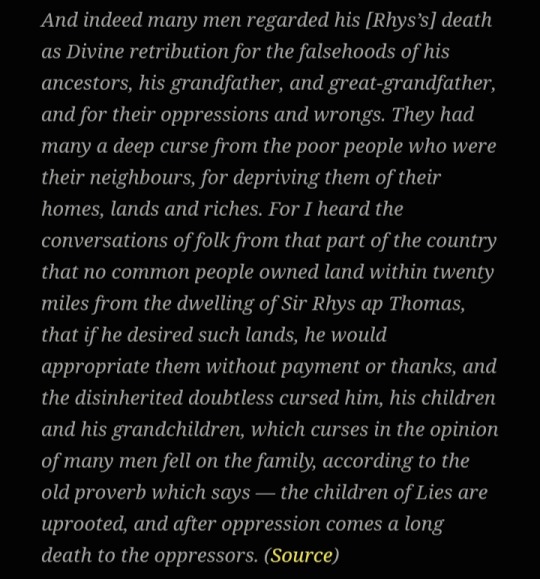
Rhys was beheaded in 1531, but Catherine was in the soup herself after all she'd been up to assisting him.
As Gareth Russell says:
'While we may never know exactly how much his own actions brought about Rhys's death, we can be certain of the devastating effect it had on his widow. She had been intimately involved in her husband's quarrel, and so the possibility that she would be accused of complicity in his alleged treason was tangible.
Left to forge prospects for their three young children — Anne, Thomas and Gruffydd — and fearful for herself, Lady Katherine followed in the footsteps of her elder brother Edmund and flung herself on the mercy of their niece, Anne Boleyn. Once again, the family's dark-eyed golden girl did not disappoint.'
It notable how often you see Anne, and later Elizabeth, willingly pull relatives out of sticky situations, which suggests at least some previous attachment on both sides, as I shouldn't imagine either would be too happy doing it for the more hostile characters.
Compare Katherine's reliance on Anne, a half-niece, to Elizabeth Seymour writing to Cromwell for help, not Jane, her own sister.
'She may even have tried to limit the damage for her aunt and young cousins shortly before Rhys's execution.'
Which was good of Anne considering Rhys had slagged her off, with both of those links having the nerve to imply his death was somehow her doing.
Had he lived, I do wonder if his opposition, compared to Catherine, who, familiarity or not, no doubt wanted to benefit from the connection, would've provoked a certain marital discord.
'Rhys had been attainted at the time of his conviction, meaning that the Crown could seize his goods and property, but his Act of Attainder specifically and unusally made provisions for his widow, who was left with an annual income of about £196.
If Anne could not save Rhys, she worked hard to salvage his family's situation.'
Meaning she got Henry to surrender some of his ill-gotten gains solely to avoid her aunt's destitution, where plenty of other widows and orphans were left to fend for themselves.
Anne also got Catherine a new husband in old-timer Henry Daubeney, but they bloody hated each other and split up soon enough.
According to Eric Ives:
'Over the winter of 1535-6, Katherine Howard, Anne's aunt, was trying to secure a separation from her second husband, Henry, Lord Daubeney. She told Cromwell that the only assistance she was receiving was from the Queen herself, and this despite the strenuous efforts which were being made to destroy her standing with Anne.
The help may have been very practical indeed; Lord Daubeney, who was certainly pleading financial hardship at one stage, reached an amicable agreement with his wife after Anne's father had made available £400.'
Even though this post about Catherine insists neither Anne nor Norfolk gave a toss about her personal woes, from the looks a things Anne was trying to solve this problem too.
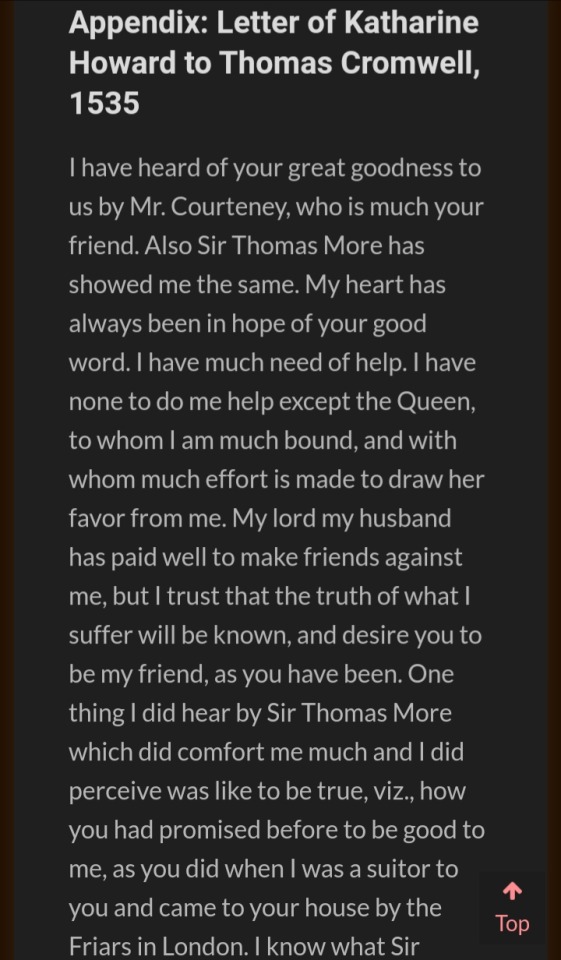
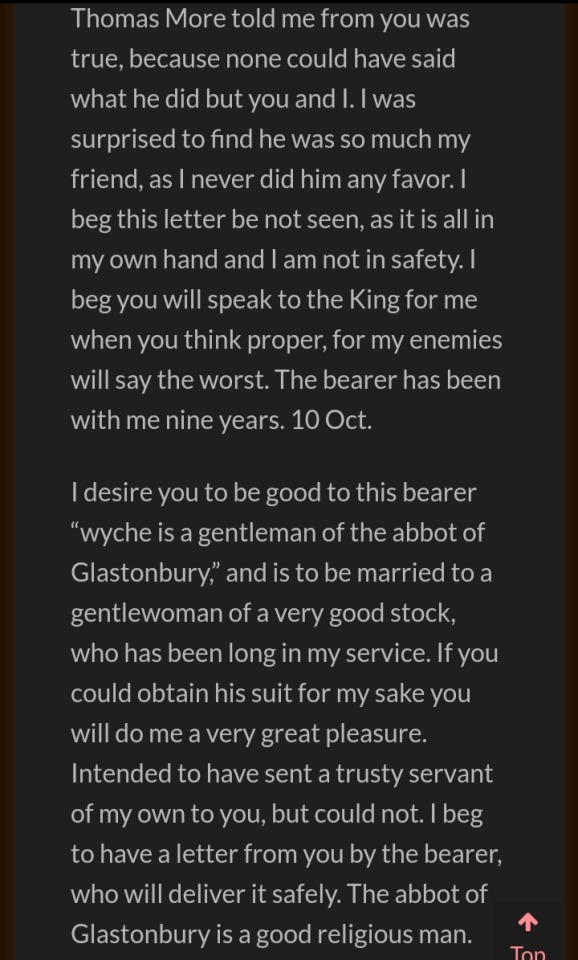
'I have none to do me help except the Queen, to whom I am much bound, and with whom much effort is made to draw her favour from me.
My lord my husband has paid well to make friends against me, but I trust that the truth of what I suffer will be known...'
One wonders how all these paid agitators ended up gathered 'round Anne, nagging or distracting her from Catherine's cause, but evidently she wasn't put off.
Plus, according to that last link, Catherine never learnt her lesson and took part in the Pilgrimage of Grace an' all, raising 3,000 men against Henry!
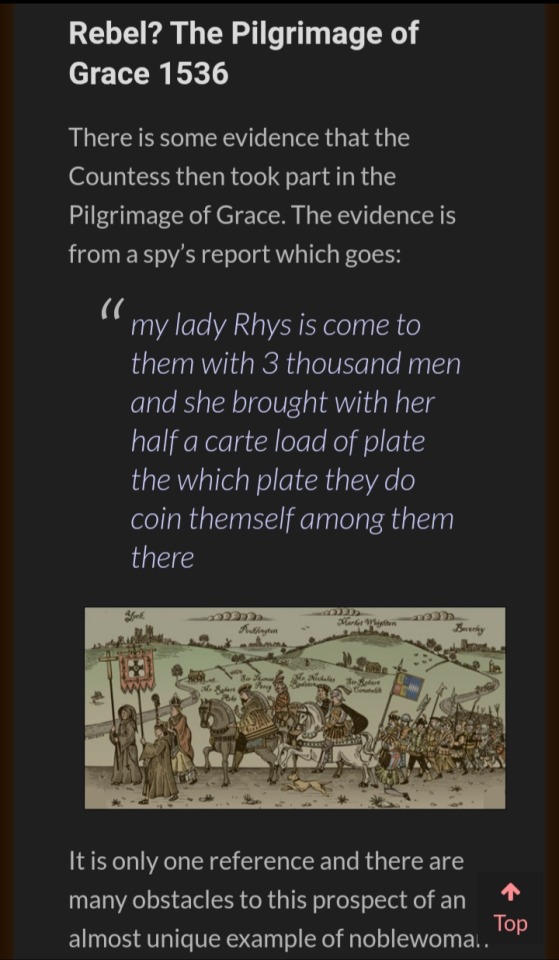
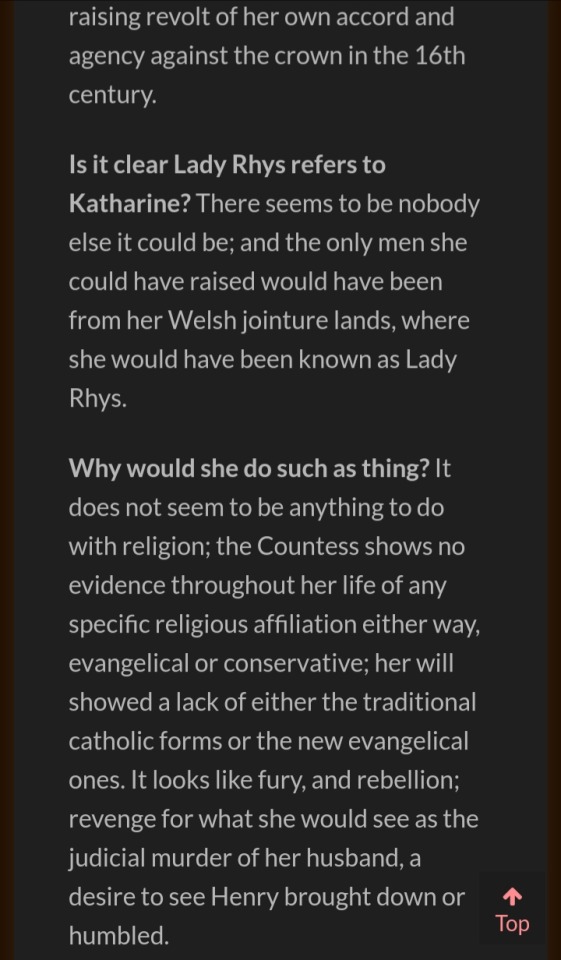
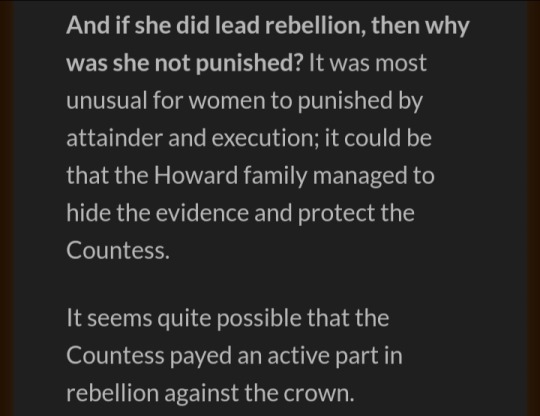
By the sounds of it, this isn't a sudden burst of furious piety at work, rather there's almost an absence of religion in Catherine's life.
The obvious explanation would be yet again wreaking vengeance in Rhys's memory, and that's evident given her long-standing vendetta against his disloyal servants.
But would it be too much to think she was motivated to a certain extent by the death of her niece and nephew, being 'much bound' to the former?
And as she avoided all punishment, the remaining Howards (i.e. Norfolk) had to have covered up for her.
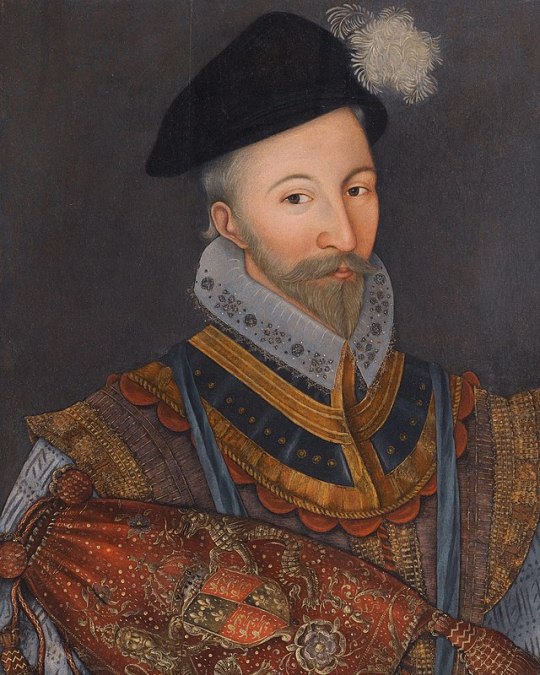
William Howard, 1st Baron Howard of Effingham
In 1529 there was much scrapping over the wardship of the Broughton sisters.
Wolsey ended up with the younger, Katherine, but upon his fall it seems Anne got the girl transferred to the care of Agnes Tilney, who then married her to William, so Anne was responsible for his first marriage.
(Not that it prevented Katherine Broughton from acting, as Ives puts it, as 'ringleader', in a demo for Mary six years later, and getting herself locked up in the Tower as a result, but there you go.)
Given the amount of important roles he enjoyed during Anne's queenship, all whilst barely out of his teens, she must have liked him:
• 1531: Ambassador to Scotland.
• 1532: Travelled to Calais with Anne to meet Francis.
• 1533: Served as Earl Marshal during Anne's coronation, in place of Norfolk.
• 1533: Held the canopy at Elizabeth's christening.
• 1535: Visited Scotland to award the Order of the Garter to James.
• 1536: Went again to Scotland to arrange a meeting between Henry and James.
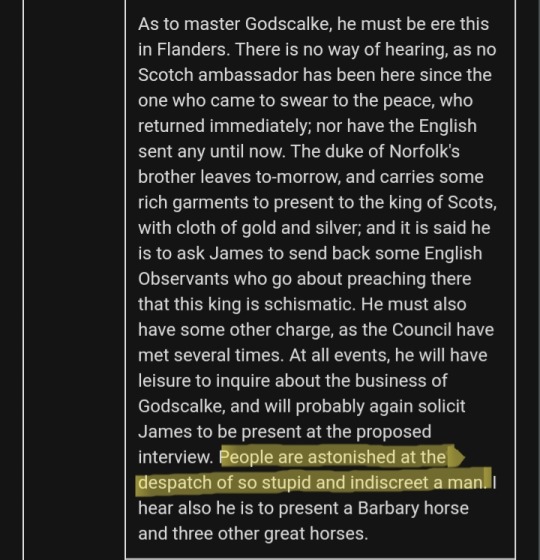
Besides, Chapuys said of him:
'People are astonished at the despatch of so stupid and indiscreet a man.'
So he had to be Anne's friend.
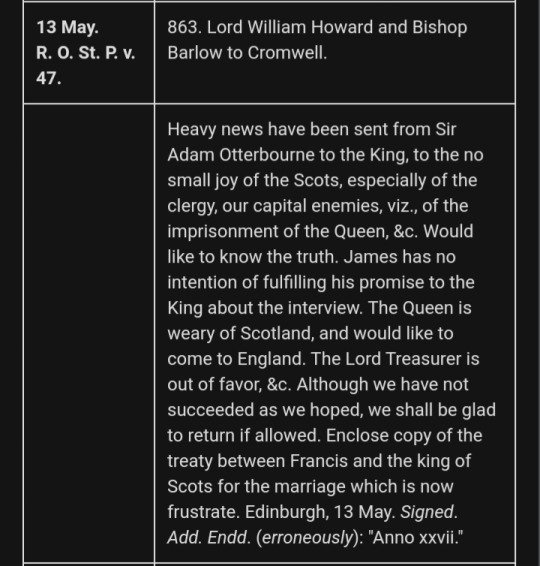
Once he hears of her arrest, William curses it as 'heavy news', demanding to know the truth from Cromwell and resenting all the Scottish clergy as 'capital enemies' for rejoicing in her fall.
Mainly I'm mentioning him to discuss his own character, and where his evident loyalty to other family might give us a further suggestion of his relationship to Anne, and how he kept to that sense of honour even when it led him into dangerous territory.
Consider, for example, how he named his son Charles after his brother, and called his daughter Douglas in honour Margaret Douglas, Charles's wife, thus commemorating their doomed romance.
You'd also be surprised how often he turns up in Young and Damned and Fair, as he appears to have been Katherine's closest uncle, for all that she's usually connected to Norfolk.
Indeed, so deep was he in it Agnes had to be advised not to warn him off coming home, meaning he arrived from France and found himself immediately clapped in the Tower, whereupon he craftily claimed all his best plate was washed overboard so Henry couldn't get at it, which worked.
Later, his connection with Henry Howard ensured he missed out on being Admiral, and when he did get it, Mary took it off him to punish his partiality to Elizabeth.
There's a section here detailing his bond with Elizabeth, where he's credited with saving her life, if you ignore the obvious errors:
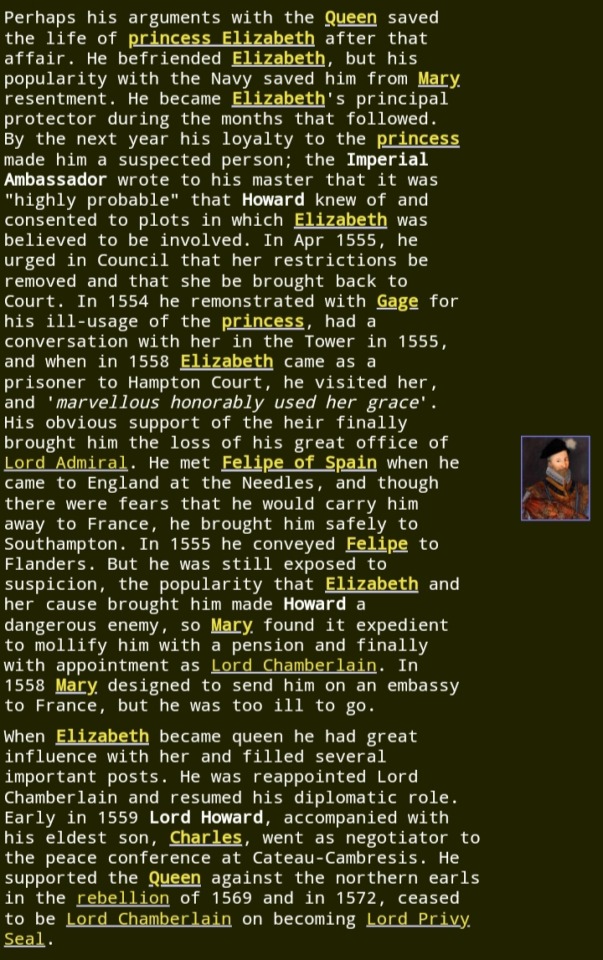
I especially like the idea everyone feared William would kidnap Philip!
However, there's a very odd paragraph in his son's Wiki page:
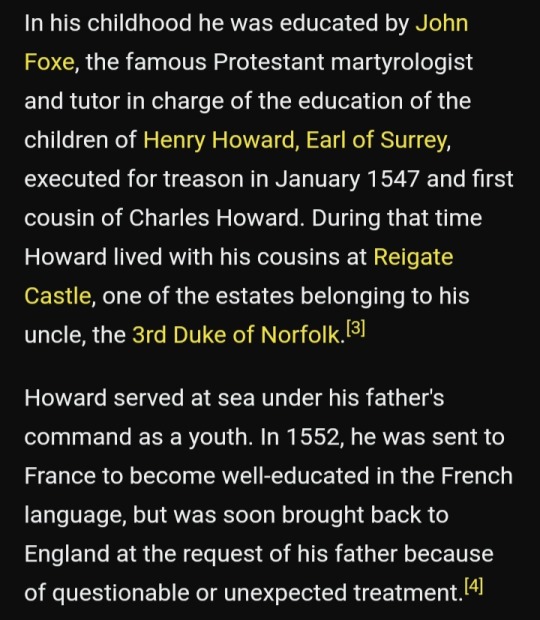
'In 1552, he was sent to France to become well-educated in the French language, but was soon brought back to England at the request of his father because of questionable or unexpected treatment.'
Am I mad or does this imply Charles Howard endured sexual abuse in his teens?
Were it only poor lodgings or sub-standard teaching, he could've moved elsewhere.
Were it excessive beating, you'd expect it to be made plain, not using all this cagey, obfuscating language.
But the thought did lead me to ponder their father-son bond, where Charles, whatever shame he suffered, knew he was loved enough that writing to his father would make it stop.
And William, reading it, rescued him immediately, proving the boy right.
This is a mere fancy of mine, but when it's just after Elizabeth's ordeal, whom he obviously cared so much about, and knowing she could easily have died like Katherine, which happened in part because he never stopped Dereham, one wonders if his moral failing then pushed him to protect Charles and Elizabeth later.
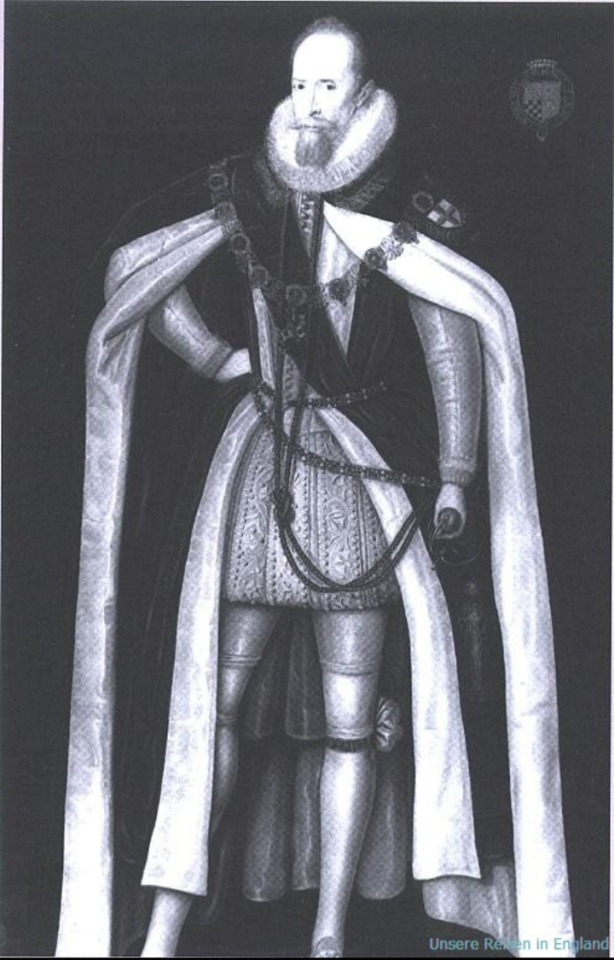
Thomas Howard, 1st Viscount Howard of Bindon
I'm hard-pressed to unearth much information on this lad, but everyone leaves him out so I won't.
There's gotta be some reason Elizabeth ennobled him, and so early on (in 1559) before he'd had the chance to serve her.
It can't just be she looked round the court, noticed he was the last of Norfolk's children, and awarded him for that.
I wish we knew more about Elizabeth's childhood, as in who she met and associated with at court, because you can be certain she met the Howards then.
I also want to add a little about his eldest son, the 2nd Viscount, who was...odd, to say the least:
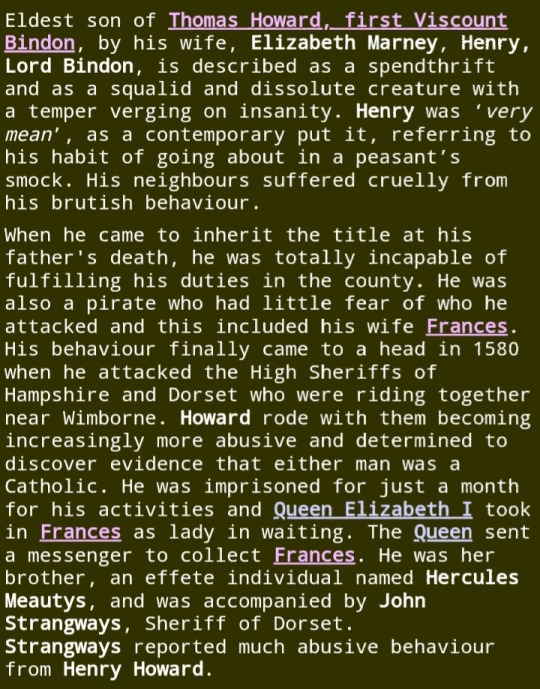
• Being a pirate;
• Dressing as a tramp;
• Beating everyone including his wife.
This gave me the the idea that perhaps his and Norfolk's reputation had somehow been rolled up together over the centuries, where this Henry Howard, although unknown today, was probably infamous in his time, and maybe his behaviour in a sense lended credibility to the accusations of spousal abuse against Norfolk, where people felt Henry 'got it from somewhere'.
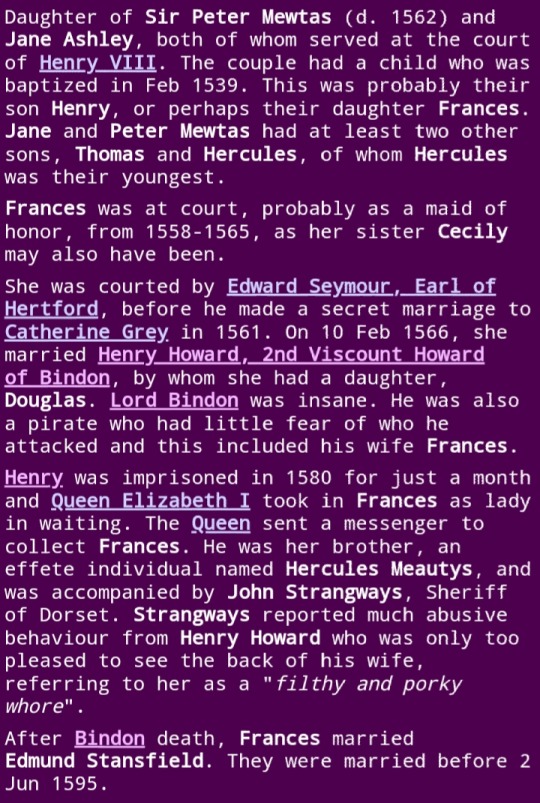
When Elizabeth learnt what he was up to, she sent Hercules Meautys (what a name) to rescue his sister, and took Frances in, with her husband dubbing her 'a filthy and porky whore', which was rich coming from him.
And his other son, the 3rd Viscount, killed his own father-in-law and had a long-running feud with Walter Raleigh.
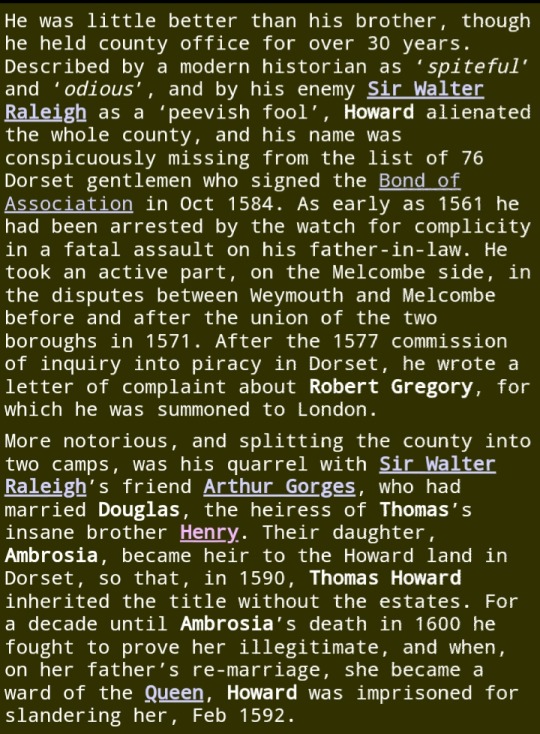
He also spent years trying to have his brother's granddaughter Ambrosia declared a bastard to grab all her land, so Elizabeth locked him up!
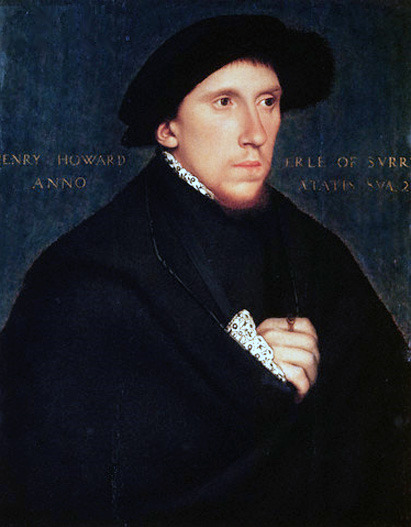
Henry Howard, Earl of Surrey
Anne found Surrey a wife and took him with her to France, where he and FitzRoy remained as honoured guests until the next autumn.
He was then obliged to serve as Earl Marshal as Anne and George were sentenced to death.
Four years later, according to Gareth Russell, Surrey not only watched Cromwell's execution, but gloated about it afterwards:
'Henry Howard, Earl of Surrey, stood at the forefront of the crowd and watched the scene without pity. He was missing his cousin's wedding to be here to see his family's bête noire finished off.
Later that day, he could not conceal his good mood. It felt to him like a settling of scores:
"Now is the false churl dead, so ambitious of others' blood."'
What does this mean?
Who's blood has Cromwell lusted after?
Who did he kill four years ago?
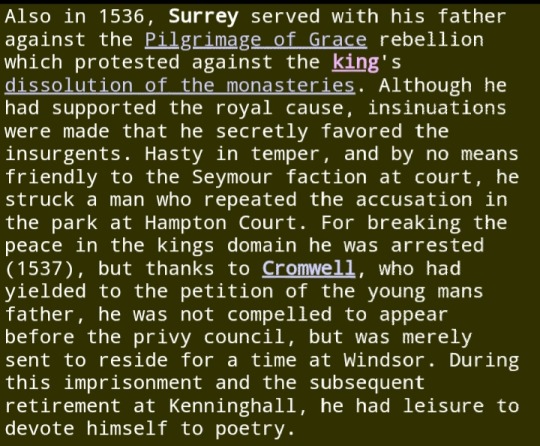
Surrey can't be referring to himself when Cromwell had actually protected him from punishment not long before, which in itself suggests a few interesting things:
• Cromwell was not yet aware of just how much the Howards despised him, as in, up til then his relationship with them was at least civil, cordial even, so the old line about Norfolk begrudging the 'new men' just because they're new men doesn't quite wash.
• This would've the perfect opportunity to bring down a mighty rival, but instead Cromwell felt bizarrely generous and intervened on Surrey's behalf, meaning he saw no harm in preserving the family, and instead thought it useful to get them on side.
• Why does he feel the need to favour the family?
Has he done something to antagonise them?
• The Howards are collectively putting on an Oscar-worthy acting routine of feigned friendliness, or at least indifference to said actions, so Cromwell, whilst he might suspect he's given slight offence, assumes it'll soon be forgotten if he pats them on the head here and there.
• Except whatever Cromwell did, saving Surrey wasn't enough to warrant forgiveness.
And let's examine this quote in detail:
Surrey is at 'the forefront' of spectators, keen to behold Cromwell dying in all its gory brutality, besides opting to watch such a horrendous deed over attending Katherine's wedding.
Instead of a happy celebration of his family's success, something he could've easily enjoyed in the knowledge of Cromwell being dealt with out of the way, he insisted on serving as a witness, as if it wouldn't be over until he'd seen it done, almost to be sure that it had.
For this would 'settle the score', shedding his blood in payback for... what exactly?
Thetford Priory?
Is that all?
Or for the blood Cromwell himself so coveted?
And even the sight of such suffering left Surrey unmoved, ridiculing the dead man not only as a 'churl', but a 'false' one.
False to whom?
'False' as in affecting loyalty to his Queen whilst working to bring her down?
Because is that extreme level of hatred really just supposed to be nothing deeper than empty class prejudice?
Usually, Cromwell's fractious history with the Howards is portrayed as Norfolk's one-man defamation campaign of all-encompassing lordly outrage verging on eye-popping insanity, except Surrey clearly loathed him too.
Perhaps from that we can conclude that Cromwell had become unpopular with the whole family, hence the 'bete noir' reference above.
When Surrey's resentment is remembered, it's conveniently boxed up and filed away as the same-old 'snobbery' of his father, which a very neat, uncomplicated excuse that prevents us looking into it properly.
I daresay Surrey was proud and class-conscious, but wouldn't everyone be like that, to a greater or lesser extent?
Why then is this 'haughtiness' only ever attributed to characters we're supposed to dislike, namely Anne, Norfolk, and occasionally George and Surrey, with the 'good' people somehow immune to such 'base' emotions?
Indeed, I'm starting to wonder how much real evidence there is for this common supposition of arrogance.
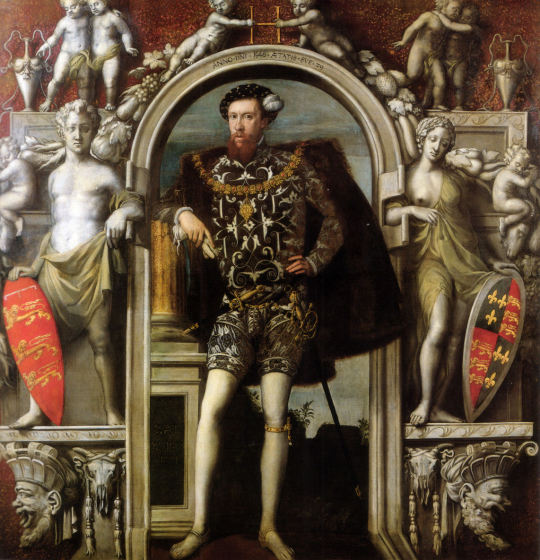
As if Surrey's known at all, it's for the manner of his death, namely he 'got himself killed' by 'stupidly' quartering the royal arms with his own, which, whilst a gross oversimplification, nevertheless defines him, where history views his character through this lens and reads his entire life backwards, as if there's no explanation for his behaviour other than he was just born to be a cocksure moron.
It plays upon modern bigotry against aristocrats, where they're all stuck-up, slow-witted inbreds fixated with the pecking order and archiac symbolism, keeping the honest worker down to prove they're better than everyone else, which is a laugh because they're all REALLY shallow, superfluous chuckleheads and deserve what they get.
Since the idea Surrey died for something so 'silly' as what badge went where slots so well into the stereotype, then it's cheapened his reputation overall.
Rather than being highly esteemed as a pioneer of English literature and the forerunner of Shakespeare, he's treated as nothing but a hot-headed toff tripped up by his own idiotic pretensions, with an end offered as a 'fitting' denouement, almost a lesson in morality; about where not 'knowing your place' or 'getting ideas above your station' leads... after vilifying Surrey and Norfolk for apparently demanding people know their place and not get ideas above their station.
Something hypocritical there.
There's also a reflexive judgementalism within this fandom and the lower end of publishing (i.e. novels and pop. history) where it's assumed if Anne or any of her family are executed, then even if they're technically innocent, they must've deserved it really, else 'the universe' wouldn't let it happen.
Therefore, known evidence is read with the most bad-faith interpretation, with any declared slip leapt upon and blown out of proportion, solely to prove their own bias correct.
You're right to think that, you are.
Hating them makes you A Good Person.
Again, this ONLY applies to Anne and her supporters, not her enemies.
No, no. They were martyrs to the Cause.
But I wouldn't say Surrey's usage of royal arms spoke to any pathological sense of superiority, certainly not to the extent it should define his memory.
Heraldry and ancestry is the lifeblood of nobility: everyone he knew fought for whatever their birth and court careers entitled them, so why shouldn't he?
Look at his sister protesting again and again and again for her rights as FitzRoy's widow: does this make her a 'snob' because she never gave up fighting?
In fact, dubbing Cromwell a 'churl' doesn't mean too much either.
The average person objects to someone because they're a thief, cheat, liar, etc. but calling them as much is a toothless insult, as they'd require a sense of honour to feel the sting.
And if they had that, they would've have committed the offence it in the first place.
So, you pick on something they probably are sensitive about, such as status or physical appearance, to get your own back.
Calling Henry VIII, for example, a fat bastard, doesn't mean you oppose him for having a weight problem, or that you dislike fat men generally.
It's that you're hitting 'below the belt' to inflict the worst punishment you can.
Oh yeah, it's petty, but the aggrieved often are.
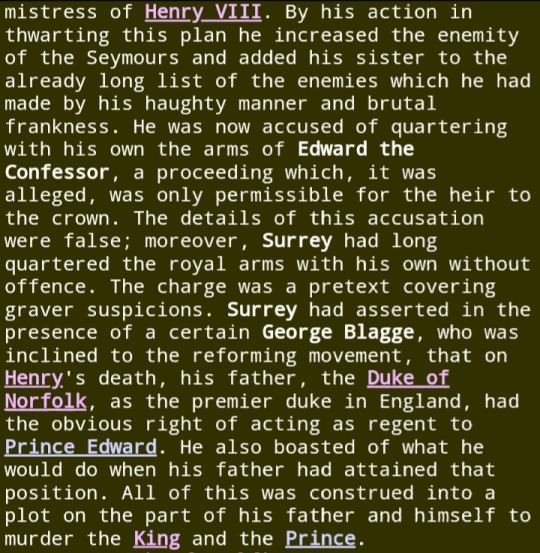
Surrey's real crime, if we deem it one, was apparently rash language of what vengeance he'd wreak on his foes once the King was gone, meaning the Seymours.
So is it mere coincidence that the main targets of this infamous 'snobbery' are those who caused or benefited from Anne's fall?
Are we to believe his only complaint, right down to twice vetoing Mary Howard's marriage, is nothing better than looking down his nose at humble Seymour origins, for they've done nothing whatsoever to draw his ire?
For all the time I've been reading history, the way the court of 1536 splits between the Boleyns and those pushing Jane Seymour, and then, once the Boleyns are wiped out, it greatest rivalry becomes Howard versus Seymour, one lasting for the remainder of Henry's reign, has always struck me as both telling and appropriate.
The idea the Howards took over hating the Seymours because of their slain family is to me to most obvious explanation; the driving force pushing the enmity beyond a decade, and blaming it all on snooty la-di-da attitudes baffles me.
It's so pat and offhand, as if it was thrown into historical research centuries ago and never questioned, passed down to us as unassailable received wisdom, rendered true from repetition, as no one likes Surrey or Norfolk enough to bother reassessing their motivations.
But could such prolonged open hostility run on no greater impulse than keeping the gentry in check?
Is THAT all?
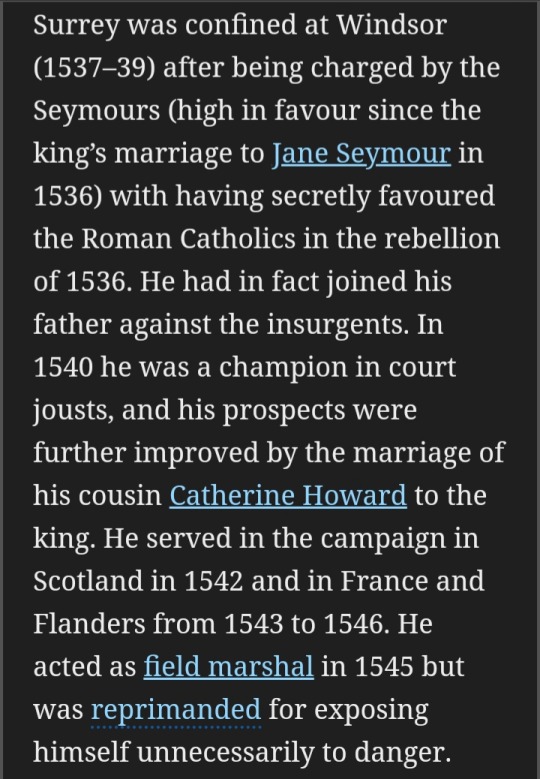
And do note how leading this narrative is, where, if we accept the Howards despised the Seymours as upstarts, then the fault for all bad blood is immediately shoved onto them and them alone, when those poor Seymour lads, rosy-cheeked and pure of heart, are just doing their best in life, working hard and loving everyone.
But oh! Those nasty Howards bullies are So Mean!
Not once is it reversed, proposing that the Seymours envied the Howards' breeding and birth, vowing to bring them down out of spite.
Instead they're absolved of all guilt in the conflict and justified in everything they do as a self-defence measure, even when they brought about Surrey's death and tried it on ten years previously.
So why on earth should he like them?
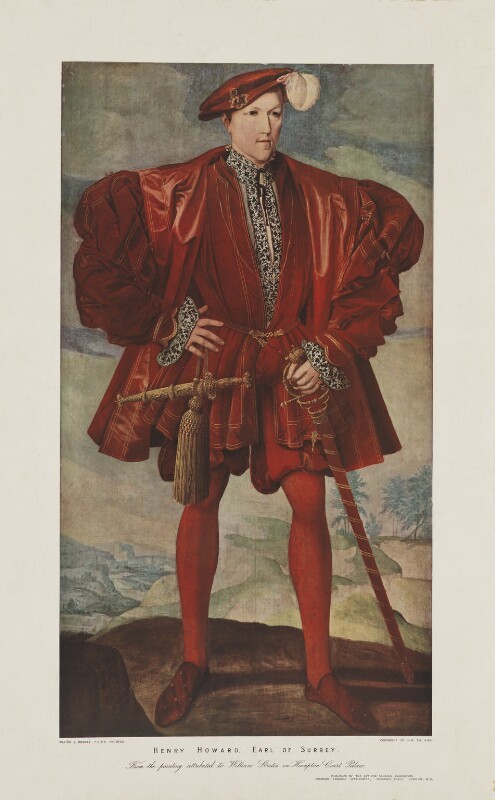
How I wish this painting still existed.
Starkey describes Henry Howard thus:
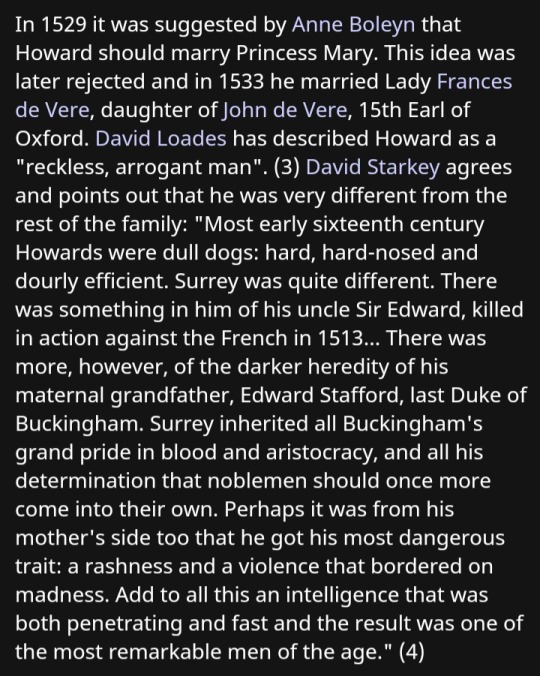
'Surrey inherited all Buckingham's grand pride in blood and aristocracy, and all his determination that noblemen should once more come into their own.
Perhaps it was from his mother's side too that he got his most dangerous trait: a rashness and a violence that bordered on madness.
Add to all this an intelligence that was both penetrating and fast and the result was one of the most remarkable men of the age.'
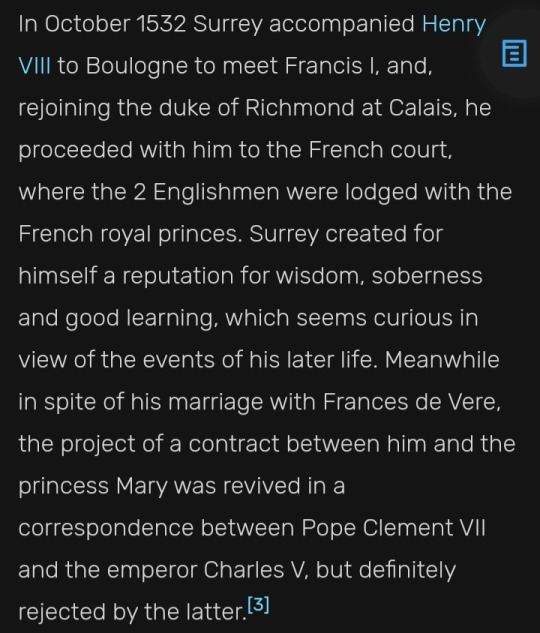
And yet I don't know of any aggressive outbursts prior to 1536, being then known for 'soberness and good learning'.
We tend to class poets of later eras as on the sensitive side, so far from being 'always like that', it may well be that the deaths of George, Anne, FitzRoy and putting down the Pilgrimage of Grace knocked him off the rails, a process then driven beyond all remedy by watching Katherine die and the suicidal shame he endured over his military failures.

Although I do like the sound of him as the hero of High Fantasy.
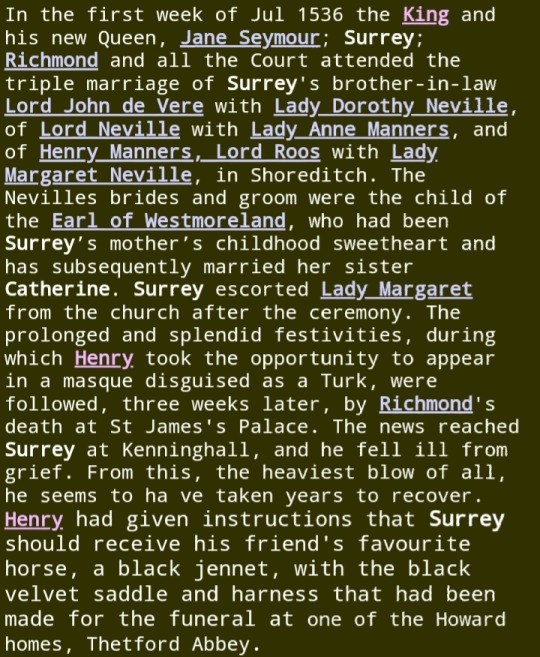
Whilst I'm here, let's look at this very awkward scenario of Surrey attending the triple Neville wedding, being the children of his mother's intended and her sister.
Considering how desperate so many are to clear Henry VIII of Anne's death, protesting how he Genuinely Believed and that makes it alright then, he's cheerful enough fannying about as a Turk less than two months later.
Finally, writing this I read several of Surrey's poems, and must include this truly endearing piece commemorating his wife's love for him:
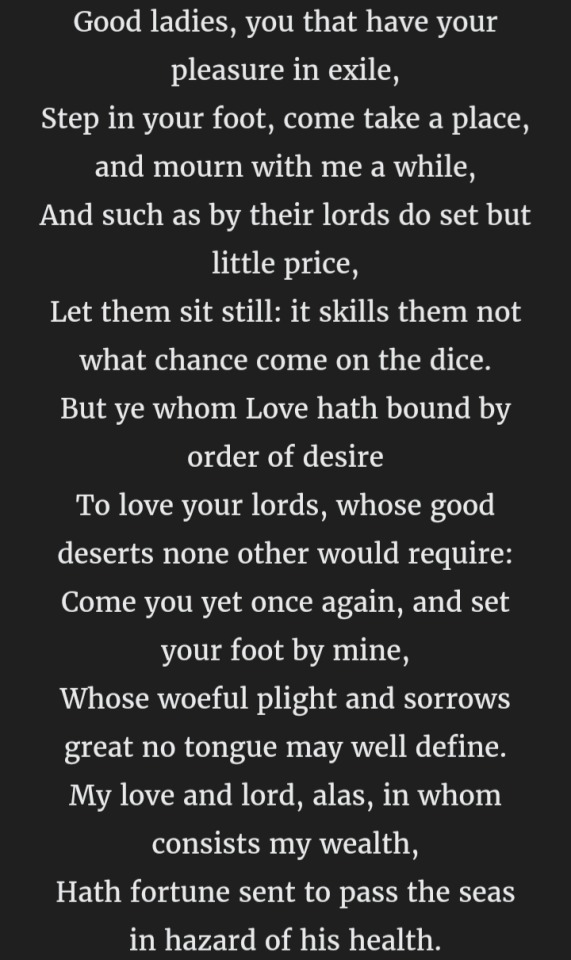
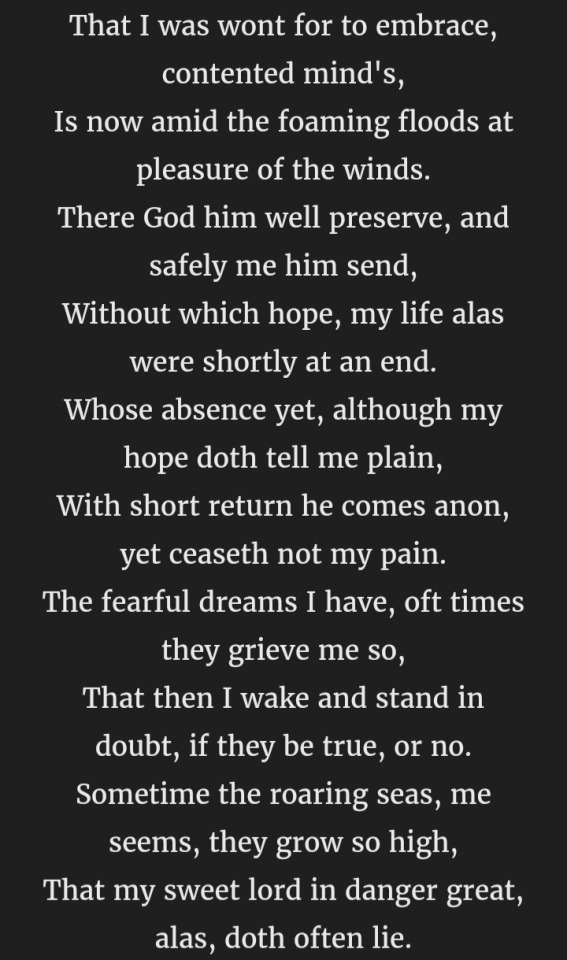
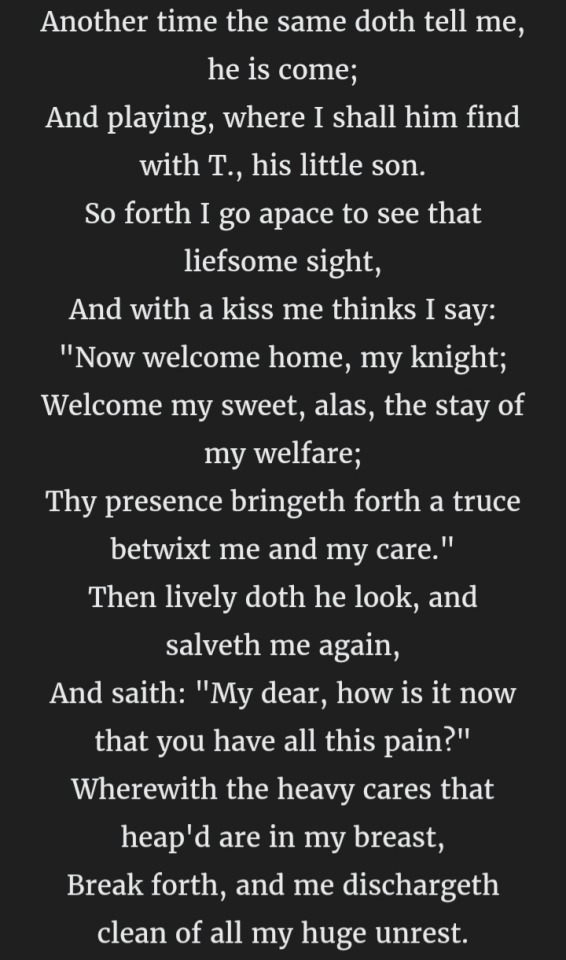
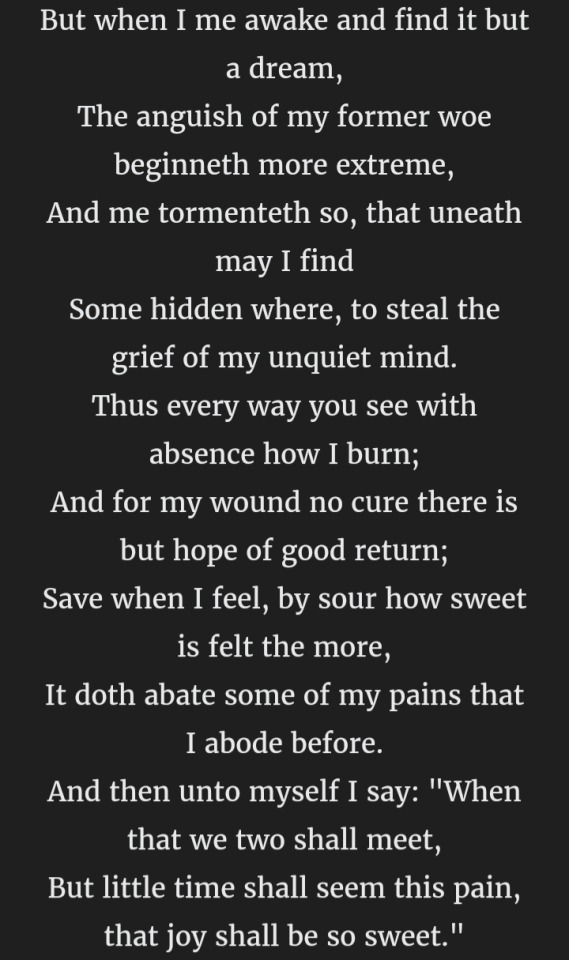
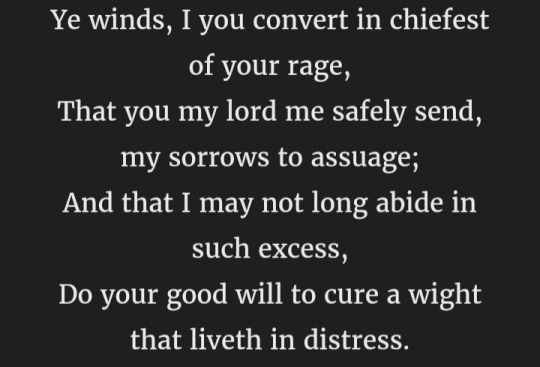
Such a poet, and still no one credits him with any tender emotions.
Anyway, don't mind me but I've hit the picture limit.
I'm not sure when Part Two will be done, but I'll let you know, come the time.
#Thomas Howard 3rd Duke of Norfolk#Henry VIII#Thomas Darcy 1st Baron Darcy de Darcy#Thomas Cromwell#Eustace Chapuys#Henry FitzRoy#Thomas Howard#Margaret Douglas#John Hussey 1st Baron Hussey of Sleaford#George Talbot 4th Earl of Shrewsbury#Mary I#Mary Howard#Anne Boleyn#John de Vere 15th Earl of Oxford#Robert Radclyffe 1st Earl of Sussex#Anne Howard#John de Vere 14th Earl of Oxford
8 notes
·
View notes
Text
Dramatis Personae (spoilers-light and corrections-light) of Nowe Thus, "" descriptions from Hunting the Falcon
Anne Boleyn, daughter of Sir Thomas Boleyn and Elizabeth Howard; wife of Henry VIII
First Introduction: Chapter 1
Henry VIII, King of England
First Introduction: Chapter 1
Sir Francis Weston, gentleman of the privy chamber
First Introduction: Chapter 1
Elizabeth Howard, daughter of Thomas Howard, Earl of Surrey and 2nd Duke of Norfolk; wife of Sir Thomas Boleyn, mother of Anne Boleyn, Dowager Countess of Wiltshire
First introduction: Chapter 2
Henry Norris, gentleman of the privy chamber, groom of the stool from 1526
First introduction: Chapter 2
Katherine of Aragon, youngest daughter of Queen Isabella I of Castile and King Ferdinand II of Aragon; married (1) Arthur, Prince of Wales; (2) Henry VIII as his first wife sister-in-law
First introduction: Chapter 2
George Boleyn, brother of Anne Boleyn; later Viscount Rochford, Warden of the Cinque Ports, Earl of Wiltshire
First introduction: Chapter 2
Mary Howard, Anne’s cousin, daughter of the 3rd Duke of Norfolk; wife of Henry Fitzroy; lady in-waiting; contributor to the Devonshire Manuscript
First introduction: Chapter 3
Jane Seymour, gentlewoman, third wife of Henry VIII
First Introduction: Chapter 4
Edward Seymour, elder brother to Jane
First Introduction: Chapter 4
Thomas Seymour, elder brother to Jane
First Introduction: Chapter 4
Margaret Douglas, Henry VIII’s niece; only child of Margaret Tudor and Archibald Douglas, and a leading contributor to the Devonshire Manuscript
First Introduction: Chapter 4
Jane Parker, wife of George Boleyn, daughter of Henry Parker, Lord Morley; one of Anne Boleyn’s ladies-in-waiting, Countess of Wiltshire
First Introduction: Chapter 5
Thomas Cranmer, Cambridge scholar and early protégé of the Boleyns; Archbishop of Canterbury from 1532
First Introduction: Chapter 6
Margaret Butler, wife of Sir William Boleyn and grandmother of Anne Boleyn; daughter and co-heir of Thomas Butler, Earl of Ormond
First Introduction: Chapter 6
Hugh Latimer, one of Anne’s chaplains; later Bishop of Worcester
First Introduction: Chapter 6
Sir William Paulet, courtier and privy councillor, Master of the Wards, comptroller of the royal household from 1532
First Introduction: Chapter 7
Princess Mary, daughter of Henry VIII and Katherine of Aragon
First Introduction: Chapter 7
Lady Anne Shelton (née Boleyn), Anne Boleyn’s aunt, mother of Mary and Margaret Shelton, custodian of Princess Mary
First Introduction: Chapter 7
Sir Thomas Boleyn, son of Sir William Boleyn and Margaret Butler; father of Anne Boleyn; later Viscount Rochford, Earl of Wiltshire, Lord Privy Seal
First Introduction: Chapter 8
Thomas Cromwell, self-trained lawyer and servant of Wolsey; parliamentary manager, Master of the Jewels and principal secretary to Henry VIII; later Vicar-general and Lord Privy Seal
First Introduction: Chapter 12
William Cavendish, gentleman-usher to Wolsey
First Introduction: Chapter 12
Lorenzo Campeggi, Cardinal and papal legate
First Introduction: Chapter 12
John Husee, court agent to Viscount and Lady Lisle
First Introduction: Chapter 12
Margaret Lee, Thomas Wyatt’s sister and mother of Elizabeth I’s Queen’s Champion, Sir Henry Lee
First Introduction: Chapter 12
Henry Fitzroy, Duke of Richmond, Duke of Somerset, Earl of Nottingham; illegitimate son of Henry VIII by Elizabeth Blount; married Mary Howard
First Introduction: Chapter 12
Sir Nicholas Carew, gentleman of the privy chamber, diplomat, supporter of Princess Mary; brother-in-law to Sir Francis Bryan
First Introduction: Chapter 12
Anne Stanhope, wife of Edward Seymour
First Introduction: Chapter 12
Dr William Butts, royal physician
First Introduction: Chapter 15
Margaret Gamage, gentlewoman; later married Lord William Howard as his second wife
First Introduction: Chapter 18
Mary/Margaret Shelton, Anne’s cousin, gentlewoman, contributor to the Devonshire Manuscript
First Introduction: Chapter 18
Lord Thomas Howard, lover of Margaret Douglas; a leading contributor to the Devonshire Manuscript; younger brother of Lord William Howard; stepbrother of Thomas Howard, 3rd Duke of Norfolk
First Introduction: Chapter 18
Elizabeth "Bess" Harvey, gentlewoman, Henry VIII's mistress
First Introduction: Chapter 19
Mary Boleyn, sister of Anne Boleyn; married (1) William Carey; (2) William Stafford
First Introduction: Chapter 19
Thomas Grey, Yeoman of the Bottles
First Introduction: Chapter 21
Charles Brandon, Duke of Suffolk; married (1) Anne Browne, daughter of Sir Anthony Browne; (2) Henry VIII’s younger sister Mary, widow of Louis XII; (3) Lady Katherine Willoughby
First Introduction: Chapter 22
Philippe Chabot, Seigneur de Brion, Admiral of France
First Introduction: Chapter 24
Catherine Carey, daughter of Mary Boleyn
First Introduction: Chapter 24
Philip Calthorpe, vice-chamberlain to the Princess Mary, husband of Jane Calthorpe, sister of Thomas Boleyn
First Introduction: Chapter 27
Elizabeth de Vere, Dowager Countess of Oxford
First Introduction: Chapter 27
Sir Francis Bryan, cousin of Anne Boleyn, gentleman of the privy chamber and diplomat; later known as the ‘Vicar of Hell'
First Introduction: Chapter 27
Henry (or Harry) Algernon Percy, eldest son of 5th Duke of Northumberland; 6th Earl of Northumberland from 1527
First Introduction: Chapter 28
Gertrude Blount, second wife of Henry Courtenay; close friend and lady-in waiting to Katherine of Aragon
First Introduction: Chapter 28
Elizabeth Carew, gentlewoman, sister of Francis Bryan, wife of Nicholas Carew, supporter of Princess Mary
First Introduction: Chapter 28
Thomas Howard, Earl of Surrey, 3rd Duke of Norfolk, Anne Boleyn’s uncle, brother of her mother Elizabeth Howard
First Introduction: Chapter 28
Margaret Pole, Countess of Salisbury, former governess to Princess Mary
First Introduction: Chapter 30
Edward Neville, cousin to Henry VIII, supporter of the Princess Mary
First Introduction: Chapter 32
#in order of...importance? /s#no but actually#especailly with paulet#literally more like#in order of what household official/ privy councilor would henry have likeliest given *this* specific task too#(or in his case...who amongst would be likelier to volunteer?#probably someone that had already had experience in 'handling' mary#and didn't want it to go to somebody worse (norfolk)#a 'middling' sort of politician#low risk and low reward#but collects up those low reward like a magpie#however; you ask me which scene i would use for a character trailer/introduction...#and that's a different question#like we see a much more subdued margaret douglas as a result of what has happened#but for an intro i would want her at her utmost spirited:#the social butterfly aspect...which would be more like chapter 18#all made different also because first introduction in the *story* is not necessarily first on the *chronological* timeline...#THAT would be a whole different order.#oh that would take me forever...it#would lowkey be fun tho...i love organizing.#realizing it's *unadulterated loathing*with every george/norris excerpt...#maybe i should do smth with that.#bi george? i like to keep it vague in RPH#'IS he...?'
11 notes
·
View notes
Text
I want that twink obliterated
Thomas Howard, 3rd Duke of Norfolk
19 notes
·
View notes
Text
Good Morning/Afternoon/Evening Lads! Let me just drop this here...
:D

Thomas Howard AKA 3rd Duke of Norfolk...
Eheh, i just found him fascinating✨
And his sheer of luck just different from others in Henry's Court to be honest :) lucky old man
#duke of norfolk#thomas howard#patrick troughton#wolf hall#tudor era#i just like to think my version of him actually the one that played by Patrick Troughton to be honest :/#six wives of henry viii#scarlet pimpernel#fanart#digital art#the mirror and the light
16 notes
·
View notes
Text
Elizabeth Stafford claimed he married her for love in one letter.
There's a seven-year gap between the birth of their last known child and Bess Holland's arrival, so there appears to have been other problems leading up to this point.
[In] 1527 Norfolk took a mistress. Elizabeth Holland, known as Bess, was the daughter of his household treasurer and chief steward John Holland. Holland came from gentry stock loosely related to John, Lord Hussey, a Lincolnshire courtier and diplomat who would be executed for his part in the Pilgrimage of Grace in 1537. Significantly, Bess became Norfolk’s mistress only after Elizabeth had given Norfolk an ‘heir and spare’ – their two sons, Henry and Thomas, were born c. 1517 and c. 1520. This cements the impression that Norfolk had made this marriage purely in the interests of procreation.
Dynastic Politics: Five Women of the Howard Family During the Reign of Henry VIII, 1509-1547, Nicola Clark
3 notes
·
View notes
Text
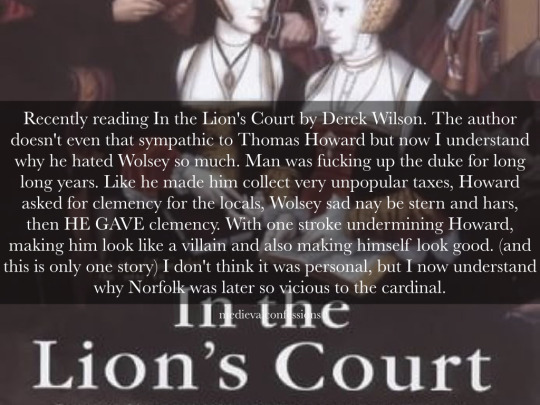
#thomas howard 3rd duke of norfolk#thomas wolsey#tudor history#16th century#english history#medieval confessions
10 notes
·
View notes
Text
matchup for @coffeebooksrain18
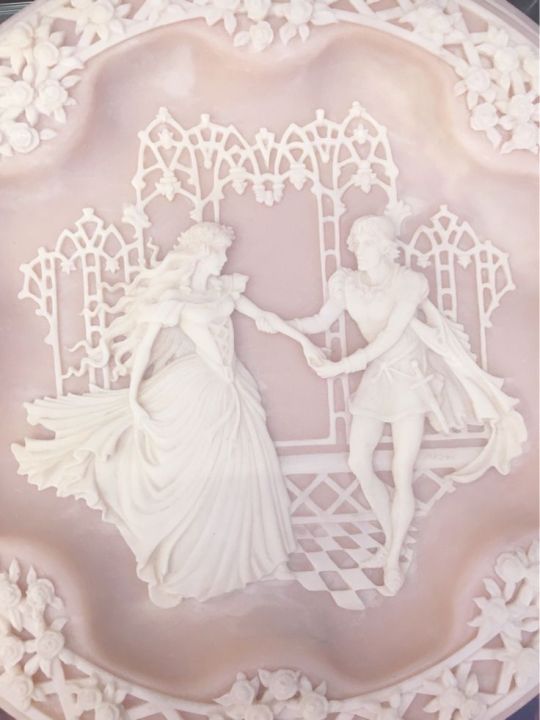
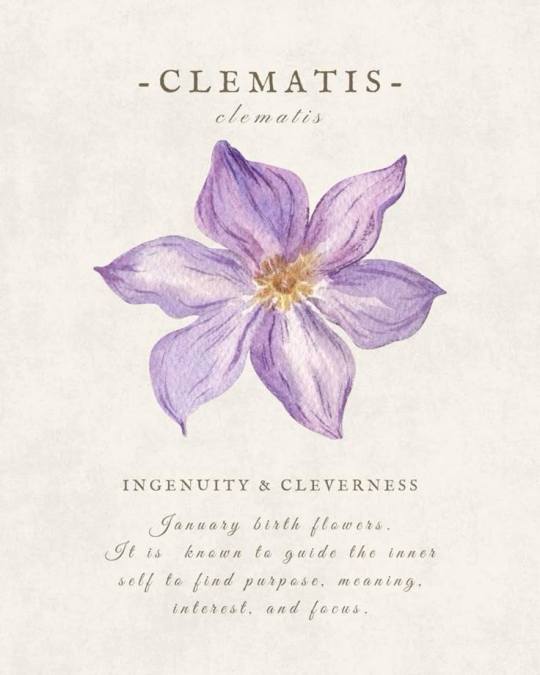

BORGIA MATCHUP

It goes without saying that Aelys’ Borgia match is Cesare Borgia — the Pope’s eldest (and often time second eldest) illegitimate son. I will not lie, I thought that I would pick Juan Borgia for her since they are both so insane, but… it just never clicked with me. Aelys needs someone who is willing to protect her, stabilize her while also matching her freak. She is someone who is flamboyant and loud and while Cesare (although not shown much in the show) is a spontaneous person, he is also grounding and brooding. Before even reading her ideal match, I immediately felt as if she would prefer and be her best self with a more brooding yet insane person and Cesare is one of the only few characters who fits that (a little note but many people often make connections with Aemond and Cesare as they are similar in nature, and this only added to my reasons for this match. Aelys thrives in chaos, but she’s not reckless—she understands power and duty, how it’s wielded, how it’s taken. Cesare is the same. His control is deliberate, his steps carefully plotted. He is not a man who plays by the rules, he creates his own, and Aelys has never been one to follow them. She was born into power, and taught that fear and admiration are two sides of the same coin. Cesare would see that in her—would respect that in her. And yet, there’s something irresistible in their differences. Cesare is composed, always calculating, always a step ahead. Aelys is instinctual, ruled by passion, by her own whims. She moves through life like a storm, laughing in the face of anyone who dares to contain her. But that’s the thing—Cesare wouldn’t try to contain her. He would unleash her. He would give her the power she craves, the freedom she demands, and in return, she would give him something no one else ever could: someone just as untouchable, just as formidable.
He wears his ruthlessness like armor; she wears hers like a crown.
HOUSE HOWARD
Aelys would be Aelys Howard of House Howard. There were one of the most ambitious and prestigious families of Tudor England, especially during the reign of Henry VIII (although the time we are currently working with is the reign of Henry VII). They were ambitious, elegant, deeply entrenched in court politics, and almost always had someone close to the crown—whether as queen, consort, or schemer. Think of:
Anne Boleyn (second wife of Henry VIII),
Catherine Howard (his fifth),
And even Thomas Howard, the 3rd Duke of Norfolk
The Howards were famous for producing beautiful women—dazzling at court, envied and scrutinized (i mean, Anne was envied and Katherine was beautiful). Aelys in her silks, rare jewels, and couture nightgowns? She'd have poets writing sonnets and queens whispering her name in jealousy. Aelys thrives in court, using her station, her sharp tongue, and her aesthetic perfection to get what she wants. That’s textbook Howard behavior. They played court politics. The Howards wanted their blood on the throne, they wanted power, yes, but they wanted it for their family. Aelys wants the best for her family, she will literally kill for them. Let’s take an example to get a better understanding: Katherine Howard was young, lively, unpredictable—a flirt, a beauty, and ultimately executed. Aelys carries that same fire, but with the steel to defend herself. And a little thing! Katherine Howard was known as “The Rose Without Thorns” and Aelys adores roses! Just a little fact!
Ship Tropes
“We Could Rule The World”
The goddess (her) x the sinner (him)
fire and ice
Ship Songs
Please Please Please by Sabrina Carpenter
Salvatore by Lana De Ray
HEADCANONS
When they first meet, Cesare sees a spoiled English lady; Aelys sees an arrogant papal butcher. Their conversations are heated, their gazes like duels—but that’s what makes them want one another. It’s not really enemies to lovers when they find the other so attractive. They’re constantly circling each other, testing, mocking, wanting. Love grows in amidst threats and it feel as if it is a flirtation with death. One moment she’s calling him a snake, the next he’s pushing her against a wall because how dare she wear that dress like that.
When Aelys and Cesare are apart, their letters become lifelines (for they can not survive without the other). Neither of them is the kind to wear vulnerability openly, but on parchment, with ink-stained fingers and distance between them, they are brutally honest. Aelys writes in looping, elegant script, scented with rose oil, the paper pressed with wax seals bearing Howard crest. She knows he reads them twice: once as the infamous Machiavelli Prince, once as a man hopelessly in love. Aelys keeps his letters hidden in the linings of her gowns and under her pillow; she’s sewn one into the hem of her favorite dancing dress, convinced it brings her luck. Cesare burns every letter after reading it—except hers. Hers, he keeps in a locked box in his private quarters, worn at the edges from being read again and again. One, with a smudged thumbprint of rose-red wax, he keeps in his breast pocket during battle.
Aelys lives for balls—gowns like armor, music like a battlefield. Cesare never dances. He stands at the edge, wine in hand, watching her even when she's in the arms of another. The court whispers. Aelys never acknowledges it. But her final dance of the night is always alone, turning slowly in a circle before locking eyes with him across the room, a smile on her lips, teasing him in a sort before turning away.
Aelys flirts shamelessly with courtiers and foreign princes, half to gather information and half to drive Cesare mad. He plays along, charming ladies, but when they’re alone? Arguments turn into slammed doors, pushed tables, and “I hate you” mumbled against flushed skin and tangled sheets.
Aelys has trouble slowing down. When exhaustion wins, Cesare gently coaxes her into letting him undo her braids. He runs a comb through her silver hair with steady hands, reverent as if she’s a holy relic. She pretends not to like it, but she always leans into his touch, eyes fluttering closed.
Cesare says it during an argument — not the first, and not the last. She’s accusing him of being reckless, of throwing his life away, and he snaps “Why does it matter to you if I die? Or do you just want the last word, Aelys?" Her mouth opens, ready to fire back. And he softens, suddenly, unexpectedly. "Because I love you. Gods help me, I do. I tried not to. I really did." He looks at her like she’s the dagger and the wound all at once. Aelys Doesn't Say It Back—At First She stares at him, silent, because for the first time in her life, she doesn’t know what to say. Love is messy. Love is powerless. Love means you might lose them. So she kisses him. Not like a lady should at all. But like a girl who’s terrified to hope and to lose. And that night, she whispers, “I suppose I do love you. I just… hate how much.”
DRESSES — English-inspired, rich with jewels, flamboyant, red, purple and black

MOONBOARD

#sazh matchups#sazh moonboards#My Alicent Hightower [ 🥀 ]#I was tempted to not give her this match bc I gave him to u#But this ship was so flicking perfect!#the borgias
3 notes
·
View notes
Text

The second fest fic has been revealed!
CLICK HERE to read THE KING'S MISTRESS by Anonymous (for now)!
Chapters: 10/10 Fandom: Harry Potter - J. K. Rowling Rating: Mature Warnings: No Archive Warnings Apply Relationships: Draco Malfoy/Ginny Weasley, Luna Lovegood/Ron Weasley Characters: Draco Malfoy, Ginny Weasley, Luna Lovegood, Ron Weasley, Voldemort, Anne Boleyn Queen of England, Henry VIII of England, Jane Parker Boleyn Lady Rochford, George Boleyn Viscount Rochford, Thomas Howard 3rd Duke of Norfolk Additional Tags: Alternate History, Tudor Era, Alternate Universe - Royalty, Mystery, Slow Burn Summary: Ginny left Draco because they stood on opposite sides of a war. But then Voldemort ensnares them both in the darkest of forbidden magic, and they find that their fates are entwined with the long-ago events of a bygone age, and with two star-crossed lovers at the Tudor court.
5 notes
·
View notes
Text
ON THIS DAY - 24 October 1537
On This Day (24 Oct) in 1537, Jane Seymour died at Hampton Court Palace, 12 days after giving birth to her only child, Prince Edward (later Edward VI).
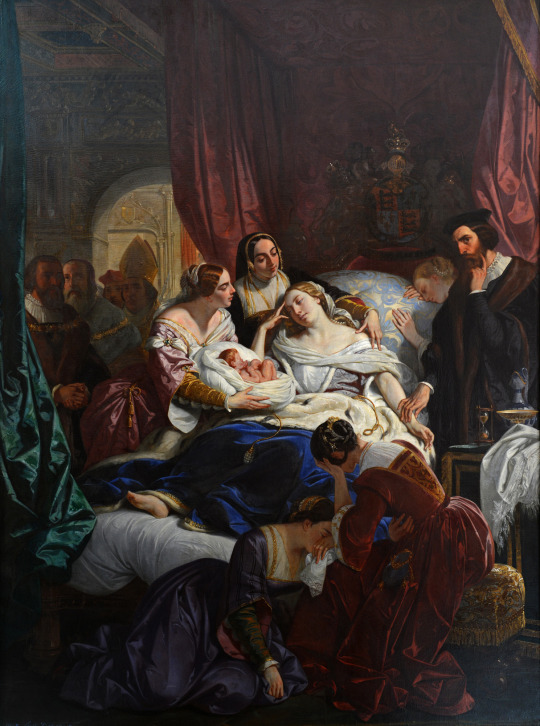
Jane had retreated to Hampton Court from London in mid-September 1537 for her 'lying-in', having escaped from the plague spreading throughout London at that time. Despite no reports of a complicated pregnancy, difficulties began once Jane went into labour on 09 Oct. Her labour was prolonged, lasting approx 30 hours; a solemn procession and prayers were said for her on 11 Oct due to concerns regarding the wellbeing of herself and the child. However, at 2 in the morning, on 12 Oct, Jane delivered a highly-anticipated baby boy, named Edward. Her husband, Henry VIII had been with his own household at nearby Esher Palace, Surrey, and on the news of the birth of his son, rode the 4 miles north directly to Hampton Court.

Edward was christened on 15 Oct in a midnight ceremony at the Chapel Royal at Hampton Court Palace. Due to the risks of plague, attendance at the ceremony was 'limited' to 400 attendees; these included the young prince's godparents Charles Brandon, Duke of Suffolk and the Lady Mary; courtier John Dudley (and likely his wife Jane Guildford), and the prince's uncle Edward Seymour, Viscount Beauchamp, who was known to have carried the young Lady Elizabeth into the chapel. As was tradition, the parents did not attend the ceremony, but rather greeted the guests in the Queen's apartments prior to the procession to the chapel, and then following the completion of the ceremony. Jane participated as expected, with no signs that she was to become so unwell so soon after.

Jane started to become unwell the following afternoon on 16 Oct. She initially suffered from diarrhoea, although stated that she felt better later on. However, during the night her condition worsened, and it became clear that she was suffering from puerperal fever; Alison Weir speculates that it was likely as a consequence of a tear in her perineum during delivery. However, at the time, there were accusations that she had been 'over-indulged' by her attendants, as the understanding of childbirth and hygiene was misunderstood at the time.
Jane's condition worsened so rapidly that she was given last rites by her confessor the Bishop of Carlisle on 17 Oct; however, she appeared to improve, and so celebrations regarding Edward's birth continued. Tragically, Jane quickly became unwell again, entering into a state of delirium, before further deteriorating. On 22 Oct, Thomas Cromwell, Henry's chief minister was informed that she was dying.

At 8pm on 23 Oct, Henry was called to Jane's bedside, and remained with her throughout the night. Last rites were again delivered to her by the Bishop of Carlisle, and she passed away in the early hours of 24 Oct.
Following Jane's death, Henry 'fled' to Windsor Castle, entering into seclusion due to his grief. Thomas Howard, 3rd Duke of Norfolk, was placed in charge of Jane's funeral and burial arrangements. Her body was embalmed on 25 Oct, with her entrails being removed and buried in the Chapel Royal at Hampton Court Palace. Her body was dressed in golden robes, wearing jewels and a crown, and lay in state in the presence chamber at Hampton Court, before being moved to Windsor in Nov, which was to be her final resting place.
Jane's ladies-in-waiting at this time included Mary Brandon, Lady Monteagle (Charles Brandon's daughter from his first marriage, and elder half-sister to Frances Brandon), Anne Parr, Countess of Pembroke (younger sister of Katherine Parr), and Jane Parker, Viscountess Rochford (widow of the ill-fated George Boleyn, who had been executed in May 1536 on charges of high treason), Whilst it is not known if Jane Guilford, Lady Dudley was one of her attendants, Jane is likely to have had a place in the new queen's court, as her husband's status rose. What is known is that she one of the women who accompanied Jane's coffin from Hampton Court to Windsor.
#tudor england#tudor history#tudor people#history#tudor women#tudor#tudors#Jane seymour#Henry viii#Edward vi#childbirth#hampton court palace#Thomas cromwell#windsor castle#jane parker#Jane Guildford#Jane Dudley
5 notes
·
View notes
Text
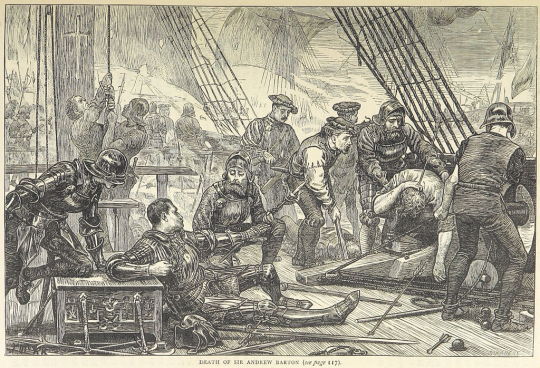
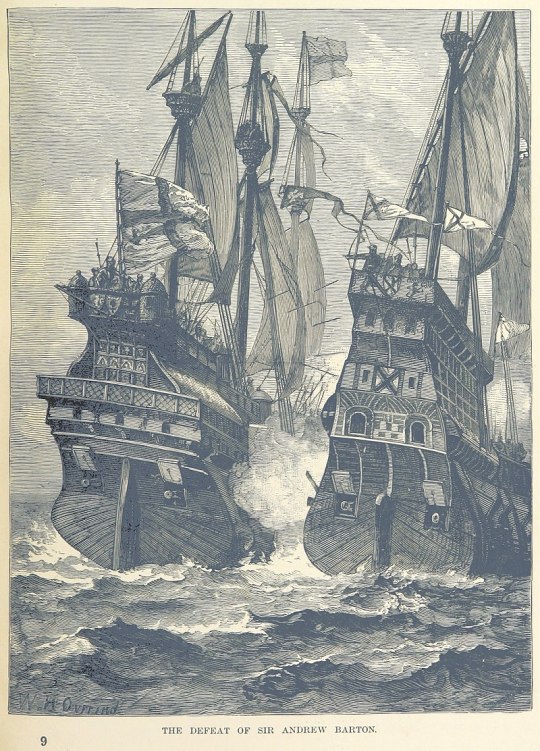
On August 2nd 1511 Scottish sailor Andrew Barton died.
Sir Andrew Barton as he is so often called, although there is no record of his ever being knighted, was among the most famous and daring sea-captains of his time.
Barton flourished during the reign of James IV, and belonged to a family which for two generations had produced able and successful seamen, Sir Andrew, as he is known although there are no records of him ever being Knighted and his brother Robert are widely recognised as the real founders of the Scotch navy. Andrew became notorious in England and Portugal as a ‘pirate’, though as a seaman who operated under the aegis of a letter of marque on behalf of the Scottish crown, he may be described as a privateer. The letter of marque against Portuguese shipping was originally granted to his father John Barton by James III of Scotland before 1485. John’s ships had been attacked by Portuguese vessels when he was trading at Sluis in Flanders.
His family is said to have taken part in a personal war with the Portuguese but it is by no means only them that the Bartons fought with on the North Sea, i found this excerpt about the run ins with the Dutch, or as they are called in the story, “The Hollanders”
In the summer of 1506, James IV appointed Admiral Sir Andrew to the command of a large, costly, and newly-built ship, and ordered him to avenge a flagrant act of injustice and cruelty committed by the people of Holland. The Hollanders had seized some Scottish ships and thrown the merchants and mariners into the sea. Sir Andrew retaliated by taking several of the Hollanders’ ships, sent to Scotland several barrels filled with the heads of the offenders, and returned himself with much booty and renown. (The writer of the Barton-Stedman Memoir excuses this bloody and barbarous act of Sir Andrew as being not unusual for that rough and turbulent time.)
In 1508, he was detained by Dutch authorities at Veere. James IV had to write to Maximilian, the Holy Roman Emperor, and others to get him released in 1509. In 1511, Andrew Barton was cruising the English coast looking for Portuguese prizes when he and his ships the Lion and Jenny Pirwyn were captured after a fierce battle with Sir Edward Howard and his brother Thomas Howard, 3rd Duke of Norfolk, off Kent at the Downs. According to the story told in ballads, Andrew was subsequently beheaded. If true, such action would perhaps have been illegal because Barton possessed a letter of marque. Contemporary English and Scottish chronicle accounts agree that Andrew died of wounds received in the fight.
I refer back to a previous posts, where James IV declared war on England, and mentioned part of the reason being the English seized two ships, this no doubt was one of them. George Buchanan, the historian and tutor of King James IV wrote that Barton continued fighting after his leg was broken by a gunshot, and encouraged his sailors by beating a drum before he died from his wounds. Buchanan emphasises that the Howards sailed on the instruction of Henry VIII following a representation by a Portuguese ambassador.
Andrew Barton appears in tow of the Child Ballads, one was originally 82 verses long, but don’t worry I’ll only subject you to a wee bit of Ballad 167, where "Sir Barton" says:
"I am hurt, but I am not slaine;
I'le lay mee downe and bleed a-while,
And then I'le rise and fight againe."
12 notes
·
View notes